For all your other comms needs, Great Communication >
T: +44 (0)207 118 1600 (8am-10pm)
- Range of Speeches
- Copywriting
- Testimonials

How to write a school leaving speech
We’ve all heard those classic school ‘leavers’ stories. The one about the sixth formers who dismantled the headteacher’s VW and reassembled it on the school roof. Or the 1st XI football team who sprayed indelible messages in weedkiller on the school football pitch.
Leaving pranks are all about ending school or college with a bang. If you’re a student, you’re caught in that no-mans land, those blissful few weeks when you’ve finished your exams but are still in school uniform. You’re part of school, but the consquences of your actions don’t matter as much. In other words, this is your moment. And if you’re going to go down in school history, you’ve got to start planning now.
But while pranks might get you instant fame, there are far better – and cleverer – ways to make sure people remember you. At Great Speech Writing, we think words have a more lasting impact. And, judging by the amount of requests we have to write school leaving speeches for students and their teachers, we’re not the only ones.
Schools and colleges now place far more emphasis on leavers than they used to. The traditional Speech Day is being hustled by high school proms, leavers’ days out, award ceremonies and concerts. While there used to be just a smattering of prizes for the more traditional academic subjects, there are now awards for EVERYTHING – from basketball to beatboxing.

So whether you’re a head master giving a prize, or a student receiving one, chances are you’re going to be asked to say a few words at the end of term. This is why we strongly suggest you have a think about what you want to say well in advance. Get your school leaving speech right and you’ll be remembered by staff and students – for all the right reasons.
How to give a school leaving speech:
Don’t assume you’ll be able to pull off a last-minute speech. Very few get away with it. Your speech will end up sounding scrappy and dull – and your peers will be waiting to have a laugh at your expense.
Keep it short
Yours is going to be one of many speeches – and your audience is mainly young. In other words they’re not going to wait patiently while you narrate an essay. A short, witty speech is what you’re aiming for. Try not to speak for more than five minutes.
Laugh at yourself
We’re not suggesting you morph into Michael McIntyre, but a few funny anecdotes will go a long way. You have an audience of people excited about leaving school for good, which means they’re in the mood for a laugh. But use laughter wisely. The best way to win over the audience is to be self-deprecating – and funny – at the same time.
Say thank you
This is really important. Your teachers have endured your chat back and classroom antics for years – and you owe them. Now is the time to tell them how much. Make sure you sound humble and sincere and they’ll love you for it, long after you leave.
Stick to the positives
This is not the time to offend your friends, teachers and colleagues. So don’t mention that time in Year 10 when a member of staff was off sick with stress. Talk about all the good stuff that has happened over the past few years. Refer to the sports matches, school plays and concerts, as well as the academic achievements. This way everybody will feel included – and confident about moving on to the next thing.
If you’re still struggling, let us take a look. We can edit, structure and write your leaving speech or your valedictorian speech. And if you are a member of teaching staff, we can help you too.
Contact Great Speech Writing on 0207 118 1600 or fill in this form.
Related Posts

Future ‘Present with Impact’ course dates

Course Success

Lawrence Bernstein
For all your other comms needs, Great Communication

A Farewell Speech to Remember: Crafting the Perfect School Farewell Speech!
Giving a farewell speech is an important part of life, especially for those graduating from high school it’s important to deliver an impressive School Farewell Speech. It’s a chance to look back on all the memories, adventures, and struggles that have made up your time in school. A school farewell speech should be heartfelt, sincere, and full of appreciation for all the people and experiences that made your time in school so special. In this blog, I’ll go over the elements of a good farewell speech, how to write one, and a sample farewell speech for school. So let’s begin!
Introduction: What is a Farewell Speech?
Simply understood a farewell speech is a monologue which is delivered by a person when leaving either a institution, group, or place. It’s an opportunity to say goodbye to the people in your life and thank them for the time you shared. In most cases the speech is delivered at a special event or gathering, such as a graduation or farewell party. The speech is usually short, but it can be longer depending on the occasion.
No matter what the occasion is, a farewell speech should be positive and uplifting. It should be a time to celebrate the past and look forward to the future. It’s also a time to recognize and thank the people which have helped in shaping you life in a good way.
What are the Elements of a Good Farewell Speech
A good farewell speech is one that is heartfelt, sincere, and respectful. It should be focused on the speaker’s time in the organization, group, or place and the people they have met along the way. Even though saying goodbye is hard and there might be some negative emotions the speech should always be upbeat and positive, with a tone of appreciation and gratitude.
A good farewell speech should also be well-structured and organized It should have a clear beginning, middle, and end. The beginning should introduce the speaker and the topic of the speech. The middle should focus on the speaker’s experiences and the people they have met. The end should include a few words of thanks and a call to action.
Finally, a good farewell speech should be short and to the point. It should be short enough to keep the audience engaged and long enough to convey the speaker’s message. Being short does not mean skipping some important parts of the speech.
Choosing the Right Tone
Right tone plays important part in of crafting the perfect speech. The tone should be positive and upbeat with a focus on appreciation and gratitude. It should also be respectful and should be considerate of the audience of the audience.
While choosing the tone for your speech, think about the occasion and the people that are listening to your. For example, if you’re giving a school farewell speech, you may want to focus on the memories that you’ve shared with your classmates and the experiences you’ve had together. You may also want to include a few words of encouragement and advice for your classmates as they move forward in life.
It’s also important to consider the length of your speech. A longer speech may require a more formal tone, while a shorter speech may be more casual.
Writing and Structuring a Farewell Speech
Writing a farewell speech is a tiring and worrisome task, but it doesn’t have to be. With just a few tips and some practice, you will be able to write an effective and engaging speech that will leave a lasting impression.
The first step in writing a farewell speech is to decide what you want to say or the message that you want to send. To do this Think about the highlights of your time in school and the people who have made an impact on your life. Once you have gotten a general idea of what you want to say, you can start to define the structure of your speech.
When structuring your speech, it’s important to create an outline so you can easily organize your thoughts. Start by writing a few bullet points for each section of your speech. Then, begin to expand on each of these points and add more detail. This will help you create a logical and cohesive structure for your speech.
Starting Your Farewell Speech

Now that you have an basic idea for your farewell speech, it’s time for you to start writing. First, Start by introducing yourself and the topic of your speech. You should explain the reason why you are leaving the people and how you feel about it which will help set the tone for the rest of your speech.
Next, thank the people who have helped you along the way. This could include teachers, mentors, friends, or family members. Show them that you appreciate their support and kindness.
Finally, you can give a short overview of the time you spent in school. This can include highlights from your time in school, the experiences you had whether funny or educational, and the people you met and how they inspired you or helped you become a better person. This will give an idea to the audience of what your speech will be about.
Writing the Main Body
Once you’ve introduced yourself and the topic of your speech, it’s time to move on to the main body. This is where you will share your experiences and the important lessons you’ve learned along the way
You can Start by talking about the people who have made an impact on your life. This could include teachers, mentors pr friends. Share stories and memories of the time you spent together and how they helped you become who you are today or what you aspire to become in the upcoming times.
Next, talk about the experiences you had in school. This could include classes, clubs, and extracurricular activities. Share the lessons you learned and how they shaped your life.
Finally, talk about the future. Share your plans for the future and your hopes for the people in your life. This will give your speech a sense of hope and optimism.
Concluding Your Farewell Speech
The final part of your speech which is the conclusion is the most important part as it is the last impression you make as a person to a group. Start by thanking the people in your life for their support and kindness and helping you become a better human being. This will engage the audience more and help them feel important.
After this, you should give a few words of advice or encouragement to the audience which admires you and strives to become a better person like you . This could include advice on how to make the most of their time in school or how to stay motivated, usually such advice is given to the juniors who plan the farewell party.
Finally, it is advised that you end your speech with a funny or witty message so that the audience remembers you for long and your legacy stays on
Tips for Delivering the Farewell Speech

Now that you’ve written your farewell speech, it’s time to practice delivering it. Here are a few tips to help you deliver an effective and memorable speech.
First, practice your speech. You may want to practice in front of a mirror or with a friend. This will help you become more comfortable with your material and build confidence.
Second, keep your voice steady and your delivery natural. Avoid rushing your words and speaking too quickly. This will help keep the audience engaged and make your speech more effective.
Third, maintain eye contact with the audience. This will help you connect with your audience and make your speech more engaging.
Finally, use emotion to your advantage. Show your appreciation and gratitude for the people in your life and your experiences in school. This will make your speech more personal and memorable.
Sample Farewell Speech for School
Now that you know how to write and deliver a farewell speech, let’s look at an example of a school farewell speech.
Good afternoon everyone. I’m honored to be here today to deliver my farewell speech. Today, I’m graduating from this school, and I want to take this opportunity to thank everyone who has made my time here so special.
First, I’d like to thank my teachers for their guidance and support. They taught me so much and have helped me become the person I am today. I’d also like to thank my friends for always being there for me. From the good times to the bad, they were always by my side.
I also want to thank my family for their love and support. They were always there to encourage me and cheer me on.
My time in this school has been full of experiences and lessons. I’ve learned a lot, experienced a lot, and met so many incredible people. I’m thankful for the memories and experiences I’ve had and the people I’ve met along the way.
As I move forward in life, I want to encourage all of you to make the most of your time in school. Take every opportunity and cherish every moment. Make sure to appreciate the people in your life and the experiences you have.
Finally, I’d like to thank you all for being here today. I’m thankful for all the love and support I’ve received from this school.
Giving a farewell speech is an important part of life, especially for those graduating from high school. It’s a chance to look back on all the memories, adventures, and struggles that have made up your time in school. A farewell speech should be heartfelt, sincere, and full of appreciation for all the people and experiences that made your time in school so special.
When writing a farewell speech, it’s important to choose the right tone, create an outline, and practice your speech. You should also make sure to thank the people in your life and share your experiences and lessons. Finally, make sure to call the audience to action and leave them with a sense of hope and optimism.
I hope this blog has helped you craft the perfect school farewell speech. Good luck!
What is a farewell speech?
What is the purpose of a farewell speech, how can i make my school farewell speech better, what happens if i feel nervous or scared, should i use hindi or english in my farewell speech, what memories i can talk of.
How To Study Effectively For Exams In A Short Time: A Guide To Ace Your Exams
Upcoming Amazon Sale 2023
Related Posts
Independence day 2023 speech: 15 august speech, swatantrta diwas speech, 150+ good morning quotes: share them with your family and friends, independence day speech 2023 for school & college students, 101+ guru purnima 2023 wishes, quotes, status, messages, and images to share, 101+ happy best birthday wishes for friends, quotes, image status,, the advantages of going to court for a motorcycle accident case.
You must be logged in to post a comment.
This site uses Akismet to reduce spam. Learn how your comment data is processed .
Type above and press Enter to search. Press Esc to cancel.

Farewell Speech for School
Farewell speech generator.
Ladies and gentlemen, esteemed Principal, respected teachers, beloved parents, and my dear friends,
Today, as we gather here to say our goodbyes, I stand before you filled with a mixture of emotions. It’s not just a farewell; it’s a celebration of our journey, the memories we’ve created, and the lessons we’ve learned.
Firstly, to our Principal and teachers, your guidance has been our north star, illuminating our paths even on the darkest nights. You’ve not only taught us academic lessons but life lessons that have prepared us for the world outside these school gates. Your patience, dedication, and unwavering support have transformed us from curious learners into ambitious individuals ready to face the future. For that, we are eternally grateful.
To my friends, what can I say? We’ve laughed together, cried together, and grown together. Our friendships have been the cornerstone of our school experience, providing comfort and companionship through every test, every failure, and every success. These bonds we’ve formed will not be measured in the time spent within these walls but in the countless memories that will continue to live in our hearts.
And to our parents, thank you for your endless sacrifices, love, and encouragement. You’ve been our first teachers, our biggest supporters, and our guiding light. Your belief in us has been the wind beneath our wings, pushing us to soar higher and dream bigger.
As we stand on the brink of a new chapter, let’s cherish the moments that have made our school life extraordinary. Let us carry forward the values and knowledge we’ve gained, using them as tools to carve out a promising future for ourselves and for the world.
To the school that has been our second home, thank you for giving us a safe space to learn, to fail, and to succeed. The hallways we roamed, the classrooms that witnessed our growth, and the playground where we forged unbreakable friendships – all of it will be dearly missed.
As we bid farewell, let us not say goodbye but ‘see you later,’ for the lessons and memories we’ve gathered here will surely cross our paths again in the journey of life.
Thank you, everyone, for being a part of our story. Here’s to new beginnings, new adventures, and the promise of a future filled with endless possibilities.
Farewell, and until we meet again.
Text prompt
- Instructive
- Professional
Generate a farewell speech for a retiring teacher who has impacted students for decades
Create a farewell speech for a graduating class reflecting on their journey through school.
Write memorable farewell speech for school leavers.

Speech on School Farewell
School farewell events stir a whirlwind of emotions. They signify the end of a memorable journey, yet herald the start of a new adventure.
It’s a bittersweet occasion, filled with joy, sadness, and anticipation. You share laughter, tears, and hopes with friends, marking a pivotal moment in your life.
1-minute Speech on School Farewell
Respected Principal, Vice Principal, Teachers, and my dear friends, we have gathered here today to bid farewell to the graduating students of our beloved school. It’s an honor and a matter of great pride to be standing here representing all of you on this nostalgic occasion.
Our school has not just been a place of education but a home. A home where we learned the essence of friendship, leadership, and teamwork. It’s here we understood the importance of discipline, respect, and humility. It’s not just the textbooks, but the life lessons we learned in these corridors will forever be treasured.
At this juncture, I would like to extend my heartfelt thanks to our respected Principal and teachers who relentlessly worked to bring out the best in us. Your guidance and encouragement have been the driving force that helped us overcome our fears and achieve our goals. You have been more than teachers, you have been our mentors.
Dear friends, as we walk out of the gates of our school, let us carry the teachings and the ever glowing spirit of our school in our hearts. May every one of us become a beacon of light, spreading knowledge and love wherever we go. Let us remember that the end of school is not the end of learning but the beginning of our journey in the wider world.
Thank you, everyone, for these wonderful years. Here’s bidding you all a fond farewell. Let’s keep the flag of our school flying high. Good luck and God bless!
2-minute Speech on School Farewell
Dear respected teachers, honorable principal, and dear friends, I stand here today with mixed emotions and a heavy heart to bid you all farewell. School, a place that has nurtured us for years, shaped our personalities and molded our characters, is now a memory that we will cherish forever.
School is not just a building made of bricks and concrete, it is a temple of knowledge where we learn to live. Teachers are not just individuals who teach lessons, they are our guiding lights who show us the right path and lead us towards a successful life. Friends are not just classmates, they are our extended family with whom we have created countless memories.
We all have spent an incredible journey of learning, growth, and development in this school. The journey was not just about academic studies, it was more about understanding life, and preparing ourselves for the future. We have learned to be disciplined, to be punctual, to be responsible, and most importantly to be kind and compassionate towards others. This school has taught us the value of hard work, honesty, and integrity which will guide us throughout our life.
Our teachers have always been our pillars of strength. They guided us when we were lost, they encouraged us when we were down, and they celebrated our success. They have not just taught us subjects, they have taught us life’s lessons. I would like to express my heartful gratitude to all our teachers for their relentless efforts and unconditional love.
I would also like to express my gratitude to our Principal who has always been a beacon of guidance. His/Her visionary leadership and unwavering support have played an instrumental role in our academic journey. Our principal’s belief in us has motivated us to strive for excellence and has instilled in us the confidence to face any challenge in life.
Friends, let us not forget that school is just the beginning of our life journey. The world out there is full of opportunities and challenges. Let us promise ourselves that we will always uphold the values and principles that we have learned in this school. Let us remember that success is not just about achieving our goals, it is also about being a good human being.
As we bid adieu to our beloved school, let us remember the good times, the laughter, the victories, the lessons, and the friendships that we have formed. Let us cherish these memories and let them be our guiding force in the journey of life.
In conclusion, I would like to say that though we are saying goodbye today, our hearts will always be connected to this school. Whatever we become in life, we will always be proud to say that we are the alumni of this prestigious institution.
Thank you and farewell.
We also have speeches on more interesting topics that you may want to explore.
One Comment
Leave a reply cancel reply.
Your email address will not be published. Required fields are marked *
- How to Order
Speech Writing
Farewell Speech
Farewell Speech | Writing Tips & Examples
10 min read

People also read
The 10 Key Steps for Perfect Speech Writing
Understanding Speech Format - Simple Steps for Outlining
How to Start A Speech - 13 Interesting Ideas & Examples
20+ Outstanding Speech Examples for Your Help
Common Types of Speeches that Every Speechwriter Should Know
Good Impromptu Speech Topics for Students
Entertaining Speech Topics for Your Next Debate
Understanding Special Occasion Speech: Types, Steps, Examples and Tips
Introduction Speech- Tips & Examples
How to Write A Good Acceptance Speech?
Writing A Presentation Speech In English: Tips And Examples
Commemorative Speech - Writing Guide, Outline & Examples
How to Write an Extemporaneous Speech? A Step-by-Step Guide
A Graduation Speech Writing Guide with Examples
Farewell speeches can be tricky to write. You might worry about saying the right things and making a good impression.
Don't worry; we're here to help.
In this blog, we'll show you how to create a touching farewell speech step by step. Whether you're new to this or have some experience, we've got you covered. You'll learn how to speak from the heart and leave a lasting memory with your audience.
- 1. Understanding Farewell Speech
- 2. How to Write a Farewell Speech?
- 3. Farewell Speech Examples
- 4. Farewell Speech At Work
- 5. Farewell Speeches By Famous People
- 6. Writing Tips for a Farewell Speech
Understanding Farewell Speech
A farewell speech is a heartfelt and often emotional address given when someone is leaving a position, organization, or community.
The main purpose of this type of speech is to reflect on the experiences shared, express gratitude, and offer best wishes for the future. Whether delivered by the person departing or by others in their honor, a farewell speech marks a significant transition and celebrates contributions made during their time together.
Effective speech writing for a farewell speech involves capturing these sentiments in a way that resonates with the audience and honors the occasion.
When to Give a Farewell Speech
Farewell speeches are appropriate for a variety of occasions, including:
- Retirement: Celebrating the culmination of a long and fruitful career.
- Graduation: Marking the end of an educational journey and the beginning of new opportunities.
- Job Transition: Acknowledging a move to a new role or company.
- Relocation: Saying goodbye when moving to a new city or country.
- End of a Term or Tenure: Concluding a term of service in an organization, club, or committee.
- Farewell Parties: Given during social gatherings arranged to bid farewell to someone.
- Departure from a Team: When a member leaves a sports team, project group, or other collaborative effort.
- Military Send-Off: For soldiers being deployed or retiring from service.
How to Write a Farewell Speech?
If the planning of your goodbye speech is intense and structured, the execution of the ideas will become easier. Once all the prewriting steps are taken effectively, follow the writing steps provided below:
Step 1 - Generating Ideas Aligned with Your Audience
Alright! First, think about who will be listening—colleagues, friends, classmates, family, or a mix? Consider what they expect and what tone and message will connect with them. Your speech should feel relatable.
Now, list the main points: memories, achievements, lessons learned, and well-wishes. Brainstorming these ideas will guide your speech direction.
Step 2 - Create an Outline
Although farewell speeches are informal and more personal, they still require a particular outline.
So, before you dive into writing, create a rough outline for your speech.
This can be a simple bullet-point list of the main sections of your speech, including the opening, body, and conclusion. Outlining helps you organize your thoughts and create a speech format .
Step 3 - Create an Interesting Opening
When you write a farewell address, you have the opportunity to be creative and personal. Begin with an attention-grabbing opening to captivate your audience.
Dull beginnings can lose your audience's interest quickly. You can kickstart your speech with humor, a casual statement, a meaningful quote, or a relatable anecdote.
After the hook, share your feelings about leaving the place or position. Greet your audience and briefly state the purpose of the event.
Struggling to come up with a good way to start your speech? Check out these creative ways to start a speech and grab your audience’s attention!
Step 4 - Create a Strong Body
The body of your speech contains the heart of your message. Here, you'll share ideas, stories, events, and key points. Be sure to provide relevant information. While crafting the body of your speech:
- Be Personal: Make your farewell speech relatable by using personal anecdotes and a conversational tone. Engage your audience with your words and emotions.
- Keep It Concise: Lengthy speeches can lose their impact. Keep it concise and straightforward. Focus on events and moments involving others, avoiding excessive self-focus. Steer clear of repeating or over-explaining.
Step 5- Provide Closure
Conclude your farewell speech by summarizing the main points and expressing gratitude. You can also extend well wishes or share a relevant quote. This closing part wraps up your speech on a thoughtful note.
Step 6 - Review and Practice
Before delivering your speech, review it thoroughly. Read your speech aloud to check the tone and flow. Practice your delivery to ensure it comes across as genuine and not overly scripted.
Farewell speeches are given in various settings and to diverse audiences.
Farewell Speech Examples
As discussed, farewell speeches are given on many occasions. Some of the most popular farewell speeches have to be American presidential speeches. These speeches reflect on the tenure, express gratitude to the nation, and offer guidance for the future.
Here is a segment from Harry Truman’s presidential farewell speech , 1953:
|
Here are some farewell speech examples for students and teachers:
Farewell Speech For Teachers
Are you a teacher by profession who is leaving the job or position from a certain school? Then you might be asked to deliver a farewell speech. The example provided below will help you write an impactful speech.
Sample Farewell Speech for Teachers
Farewell Speech for Students
Students often find writing farewell speeches daunting. Whether it is a graduation speech or just a goodbye speech in a classroom, students have no idea what to say.
If you need to give a farewell address at school, here are some samples:
Sample Farewell Speech for Students
Farewell Speech by Students Leaving School
Farewell Speech in English
Farewell Speech for Seniors
Need more sample speeches? Explore these speech examples of multiple types of speeches to get inspiration!
Farewell Speech for Friends
Saying goodbye to friends or family members is the hardest but delivering a speech to them is the easiest.
As it is an informal type of speech, people can start from anywhere and say anything. But if you are not sure how to say goodbye to friends, take help from the example below.
Sample Farewell Speech for Friends
Farewell Speech At Work
Saying goodbye at work, be it in a retirement speech or when leaving colleagues, marks a significant moment in your career. Let's look at two common work occasions for giving a farewell speech:
Farewell Speech for Boss
This speech is given when your manager is leaving the company or moving to a new position. It includes an introduction, appreciation for their leadership, personal anecdotes, well wishes, and a warm farewell.
Here’s a sample speech for biding your boss goodbye:
Farewell Speech For Boss
Farewell Speech for Colleagues
Farewell speeches for colleagues are given when a team member is leaving the organization, transferring to a different department, or relocating.
Here’s an example of how you can create a speech for your co-worker:
Farewell Speech For Colleague
Farewell Speeches By Famous People
Here are five farewell speeches by famous personalities:
- Winston Churchill
"We shall not flag or fail. We shall go on to the end. We shall fight in France, we shall fight on the seas and oceans, we shall fight with growing confidence and growing strength in the air, we shall defend our island, whatever the cost may be."
- J.K. Rowling (Harvard Commencement Speech)
"It is impossible to live without failing at something, unless you live so cautiously that you might as well not have lived at all, in which case you have failed by default."
- Michelle Obama (Farewell Address as First Lady)
"Being your First Lady has been the greatest honor of my life, and I hope I’ve made you proud."
- John F. Kennedy (Inaugural Address)
"Ask not what your country can do for you; ask what you can do for your country."
- Meryl Streep (Golden Globe Acceptance Speech)
"When they called my name, I had this feeling I could hear half of America going, 'Oh, no. Oh, come on, why her? Again?' But whatever."
Writing Tips for a Farewell Speech
While there are no strict rules for speechwriting, some tips can make your address memorable.
- Share Personal Experiences - Share your stories and incidents to make your goodbye address memorable. Through your personal experiences, state how things and actions of others influenced you and your life
- Show Gratitude - Showing gratitude is the right attitude. Thank people and their gestures with an open heart.
- Keep it Short - Avoid dragging your speech and share interesting information only.
- Use Simple Words - Avoid using bombastic vocabulary. You are not there to impress anyone but just to be grateful for your efforts.
- Be Original - Copying the addresses of others is not the right choice. Be unique and original and write your content for the speech.
Now that you've gained insights into crafting a meaningful farewell speech, you can create a memorable and heartfelt address.
However, if you're feeling lost and need assistance in crafting a farewell speech, let our legit essay writing service help. Our team of experts boasts years of experience in delivering high-quality speeches.
Just buy speech from our writers and they will undoubtedly exceed your expectations!
Frequently Asked Questions
What words to say in a farewell speech.
You might say:
- "I am grateful for the opportunity..."
- "It has been an honor to work with..."
- "I will always cherish the memories we've shared..."
- "I look forward to our paths crossing again..."
How do I start a farewell speech?
Start with a warm greeting and thank the audience for being present.
For example: "Good [morning/afternoon/evening] everyone. I am deeply touched to see so many familiar faces gathered here today..."
How to say goodbye speech to colleagues?
- Express gratitude for the opportunities and experiences.
- Share personal reflections or memories.
- Offer well wishes for their future endeavors.
Example: "To my wonderful colleagues, it's with mixed emotions that I say goodbye today. Working alongside each of you has been an incredible journey..."
What is a good farewell quote?
- "Goodbyes are not forever, are not the end; it simply means I'll miss you until we meet again." - Unknown
- "The hardest part of leaving is saying goodbye to those who you have grown close to." - Unknown
- "Don’t cry because it’s over, smile because it happened." - Dr. Seuss

Write Essay Within 60 Seconds!

Dr. Barbara is a highly experienced writer and author who holds a Ph.D. degree in public health from an Ivy League school. She has worked in the medical field for many years, conducting extensive research on various health topics. Her writing has been featured in several top-tier publications.

Paper Due? Why Suffer? That’s our Job!
Keep reading


Farewell Speech Examples For Every Situation

When you move on in life from a job, a neighborhood, or a position, you may be formally honored and need to make a farewell speech on your last day. While most goodbye speeches follow a simple format, you can pattern your address after these farewell speech examples.
Saying goodbye can be emotional and challenging, but delivering a heartfelt farewell speech leaves a lasting impact on the hearts and minds of those present.
This article explores inspiring examples of farewell speeches , showcasing the power of words to express gratitude, share memories, and inspire hope for the future. Whether bidding farewell to colleagues, classmates, or loved ones, these speeches offer a glimpse into the art of saying goodbye with grace and eloquence.
Table of Contents
What Should You Say In A Farewell Speech?
In the best farewell speeches , people express their gratitude, share memories, and leave a positive lasting impression. Some common elements include:
- Speakers often express gratitude to the individuals or groups they are addressing, acknowledging their support, friendship, or guidance throughout their journey together.
- Farewell speeches often r eflect shared experiences , memorable moments, and accomplishments. Speakers may recount anecdotes, highlight achievements, and reminisce about the time spent together.
- Speakers often extend their best wishes to the group of people in attendance , expressing hopes for their future endeavors. They may offer encouragement, inspire confidence, and express optimism about what lies ahead.
- Farewell speeches often include recognizing and appreciating specific individuals who have had a significant impact. This can involve expressing gratitude to mentors, colleagues, friends, or family members who have supported and influenced the speaker’s journey.
- Speakers may reflect on personal growth and lessons learned . They might share insights gained, challenges faced, and how those experiences have shaped them as individuals.
- Farewell messages often create a sense of closure and unity by emphasizing the importance of the shared journey and the connections formed. Speakers may encourage ongoing relationships, express a desire to stay connected, and leave the audience with a sense of unity and togetherness.
Tailor the content of your speech according to the situation and audience. For example, the mood of your address may be lighter at a farewell party than at a more intimate occasion in an office.

How Do You Start A Farewell Speech?
A good farewell speech captures the audience’s attention and establishes a connection. You can do this by acknowledging the presence of everyone gathered and going into a heartfelt opening. Sharing a personal anecdote or a reflective quote sets the tone and establishes an emotional connection with the listeners.
What Should I Do If I’m Too Nervous To Speak?
Many people find the thought of public speaking terrifying , and it’s quite common to experience feelings of dread and sickness in the days and hours before you speak. The following steps may help you alleviate these symptoms:
- Before stepping up to speak, take a few deep breaths to help relax your body and calm your mind. Deep breathing can help reduce anxiety and nervousness by providing a moment of focus and centering.
- Adequate preparation is key to building confidence. Rehearse your speech until you are entirely familiar with the content and have become comfortable with the flow and structure. Practice in front of a mirror or with a trusted friend or family member to gain feedback and build confidence.
- Begin your speech with a strong and engaging opening line or anecdote that captures the audience’s attention, maybe about your personal life. This can help you overcome initial nerves and establish a positive connection with the listeners.
- If appropriate, consider using visual aids or notes to assist you during the speech. Having key points or reminders written down can help you stay on track and provide a sense of reassurance.
- When speaking, consciously slow down your pace and remember to incorporate pauses . This lets you gather your thoughts, maintain composure, and engage with the audience. Pauses can also help you manage nerves and project confidence.
- Remember, the audience is there to support you. Maintain eye contact, smile, and engage with them . Consider focusing on receptive or friendly audience members to help you feel more at ease.
- Feeling nervous is totally natural and even expected in public speaking. In fact, you should experience some trepidation. Embrace any imperfections and be authentic in your delivery . Share your genuine emotions and tell the audience you value their presence.
- If your nerves persist, seek support from a trusted friend, family member, or mentor. They can offer guidance, encouragement, or even accompany you during your speech for added confidence.
You can overcome your nerves with practice, preparation, and a positive mindset and deliver a memorable farewell speech.

What Should I Do After The Speech?
After delivering your farewell address, wrap up the speech effectively and engage with the audience. Here’s what you can do:
- Take a moment to thank the audience for their attention. Let them know how much their support and camaraderie have meant to you. Wish them good luck in their future endeavors.
- Depending on the setting and the nature of the farewell, you can i nvite the audience to ask questions or share their thoughts. This can create an interactive and engaging atmosphere, allowing for further connection and dialogue.
- After the formal part of your speech, make an effort to interact with the audience individually . Approach people and engage in conversations.
- Use the opportunity to network with colleagues, classmates, or other attendees . Exchange contact information with individuals you would like to stay connected with.
- Take some time to r eflect on the experience of delivering the goodbye speech . Consider what went well, what you could improve, and any lessons learned. Reflecting on your performance can help you grow as a speaker and build confidence for future public speaking engagements.
- If possible, seek feedback from trusted individuals present during your speech. Ask for their honest opinion, constructive criticism, and suggestions for improvement. Feedback provides valuable insights and helps you refine your speaking skills.
- After the farewell event, consider sending thank-you notes or messages . This gesture shows appreciation and reinforces the connections you have formed.
What Are Some Good Farewell Speech Examples?
Here are some sample farewell speech excerpts:
Leaving A Job
“Good evening. Looking back, I am reminded of the countless triumphs we achieved together. From overcoming complex challenges to celebrating major milestones, we have consistently demonstrated the power of teamwork and unwavering dedication.”

Transferring To Another Office
“Throughout my time in this office, it has been a privilege to work alongside some of the most talented individuals who have inspired me every day. Together, we have tackled challenges, celebrated successes, and created a vibrant and supportive work environment. The fond memories we have shared will always hold a special place in my heart.”
“Dear friends and neighbors, I stand before you on this special occasion with mixed emotions as I bid farewell to this beloved neighborhood that has been my home for many years. As I prepare to move to a new house, I am reminded of the countless memories and the strong sense of community that has made this place so special.”
Joining The Military
“Joining the military is not merely a career choice; it is a commitment to defend and protect the ideals we hold dear. Standing alongside the brave men and women who dedicate their lives to safeguarding our nation’s freedom is an honor. I find it hard to find the right words, but I am humbled by the opportunity to contribute to this noble cause and be part of a legacy of courage, sacrifice, and selfless service.”
Going Away To College
“Standing here today, I am humbled by the tremendous support and guidance I have received from my parents and teachers. Their unwavering belief in my potential has prepared me for this natural progression from high school to college, where I am eager to embark on a journey of self-discovery, hard work, knowledge, and endless possibilities.”
Leaving Your Post In An Organization
“Good morning. I leave the business today with a mixture of gratitude and a sense of heaviness in my heart. My journey with my manager and colleagues has been transformative, and their unwavering support and guidance have prepared me for this moment. While it has been incredibly difficult to make the decision to move on, I believe it is time for me to embark on a new path, carrying with me the cherished memories and lessons we have shared.”

Adam Howarth
Adam covers the topic of Public Speaking for Digital Authority. From his first experience of oratory with his school debating society to his more recent experiences of promoting the local business scene in Wrexham, Wales, he has always been involved in public speaking.
Recent Posts
Active Listening Absorbs The Whole Message, Not Just The Words
Active listening goes beyond hearing the words someone is saying to you and understanding the message they are conveying. Many only hear a small percentage of what is being said as they are...
Counteracting Fear Of Public Speaking With Coaching And Therapy
Nearly 75% of people experience the social phobia of fear of public speaking. The result may be nervousness before speaking or a full-blown panic attack. Practicing public speaking may lessen the...
- Delivery Techniques →
Farewell Speech Examples: How to Say Goodbye with Grace
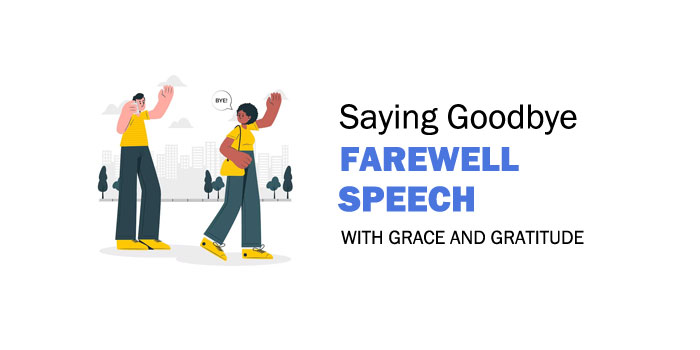
As much as we’d like our goodbyes — whether to a job, a loved one, or a chapter in our lives — to be extended and leave us with a lasting feeling of warmth and appreciation, that isn’t always the case.
A well-crafted farewell speech has the potential to turn any difficult goodbye into a fond farewell, leaving all parties feeling gracious and grateful. To guide you in bringing your goodbye to its highest form, let’s delve into the art of delivering a good farewell speech.
What is a Farewell Speech?
A farewell speech is a way to mark one’s departure from an organization, group, or event. It’s typically delivered by someone who is leaving or has recently left their role or position in the organization and is typically intended to say thank you and express empathy and gratitude for the audience.
Farewell speeches often include a call to action for those who remain in the group or organization, providing insights and advice that can help the group move forward even after the speaker leaves.
The debate about what constitutes an effective farewell speech depends largely on the context of the particular situation.
On one hand, some people argue that a simple goodbye and thank you are all that is needed in order to properly bid farewell. They might argue that more than this would be repetitive and unhelpful as it would not add any new information or create any additional value.
On the other hand, others argue that a more detailed goodbye and send-off provides more closure, comfort, and support, allowing those remaining to better process the change and find growth opportunities in it.
No matter the approach taken, however, it’s important to recognize that farewell speeches are important moments for both those who are leaving and those who are staying; they provide an opportunity for reflection on memories shared, lessons learned, and relationships formed—all of which contribute to making an impactful farewell experience.
With this in mind, the next section will discuss what makes an effective farewell speech.
Quick Answer
A farewell speech is an important way to mark one’s departure from an organization, group, or event. It usually includes gratitude and a call to action for those who remain in the group. Farewell speeches often include a reflection on memories shared, lessons learned, and relationships formed. What constitutes an effective farewell speech depends on the situation but it should provide closure and comfort.
What Makes an Effective Farewell Speech?
The delivery and content of a farewell speech can significantly influence the sentiment behind goodbye messages. It’s important for sendoff speakers to emphasize gratitude and to express their appreciation for the time spent with colleagues, friends, or family.
A successful farewell speech should be heartfelt, sincere, and thoughtful. When crafting a farewell speech, speakers may want to consider incorporating elements like humour, humility, and inspiration in order to add depth to their words.
Additionally, touch upon shared emotions to convey the bond between both parties. Focusing on these three elements allows for a memorable sendoff that will stick with the crowd in attendance.
Humour is an effective way of connecting with the audience and lightening the atmosphere; providing some levity amongst more serious anecdotes. Self-deprecating remarks can be a way of connecting with colleagues in a more intimate way; showing you are equally as human as they are.
On the flip side, too much humour can sometimes come across as insincere and hinder the speaker’s attempt at conveying genuine emotion; arguably one of the key components of an effective farewell speech.
Moreover, include inspirational stories which feature distinct examples of gratitude within them—this will create greater authenticity and leave guests feeling impacted by your words.
As aforementioned, it’s vital for goodbyes to incorporate appreciation for time spent together—evoke specific memories and draw attention to individuals when necessary rather than speaking in generalities.
Ensure that your words make an impact on those who need to hear them. With these in mind, it’s possible to craft a successful transition from one stage of life to another through an effective farewell speech that is full of grace and gratitude.
Having addressed what makes an effective farewell speech, we’ll next discuss how best to show appreciation in sending off messages.
Showing Appreciation
Showing appreciation is a key element of any farewell speech. Expressing gratitude for the years spent in each other’s company conveys respect and admiration for all that has been accomplished.
When it comes to including words of acknowledgement and appreciation, many people choose to highlight the special moments shared, celebrate the successes seen, and offer thoughtful acknowledgements or simple thank yous.
However, there are opposing opinions on how to best show appreciation. Some suggest keeping dedications to a minimum so as not bore listeners with too much detail while others believe a more thorough approach can help create lasting memories and nostalgia.
The most important thing is to be mindful of your audience and what feels right based on the relationship that the farewell speech is celebrating.
If appropriate, consider having a moment at the end of your speech where you thank everyone individually while explicitly naming their individual contributions. A more public approach can include a round of applause directed at individuals who have had an impact on you along your journey.
In conclusion, expressing appreciation in a farewell speech provides an opportunity for reflection and celebration of meaningful experiences. Celebrating the occasion marks a special moment in time as one move forward in life or career.
Celebrating the Occasion
When someone is leaving their current role, it is important to take some time to celebrate and recognize their achievements. Celebrating the occasion acknowledges their contribution, gives thanks for their hard work, and shows gratitude for their time.
It can be a meaningful gesture that highlights the value of the departing employee or colleague, and can also be an inspiring opportunity for those who remain in the position.
In planning a celebration for the person’s departure, consider what would best suit their personality and interests. A simple going-away party, a framed thank-you card, or another creative form of recognition might be just the right way to say goodbye.
However, it is also important to consider how this celebration could affect morale and productivity within the team. If there is already tension in the workplace due to changes in leadership or a reorganization of roles, then holding a celebratory event could serve to further emphasize inequalities among employees or even create an uncomfortable environment.
When deciding how best to celebrate someone’s departure, it is important to assess both potential positive and negative implications of any action and plan accordingly. Doing so ensures that both the departing employee or colleague is properly recognized as well as all other members of the team feel respected and appreciated for their own contributions.
By acknowledging this balance appropriately, it will help ensure that everyone feels included and appreciated when saying goodbye. From here we can move on to discuss how to use a farewell speech to inspire your audience.
Inspiring Your Audience
In order to move an audience and leave a lasting impression, it is important to ensure that your farewell speech is both inspirational and meaningful. To do this, consider talking about how much the experience meant to you, how much you have enjoyed and learned from your friends and colleagues, or highlighting the greatest accomplishments of the group.
Additionally, use personal anecdotes that reflect the experiences of everyone in the audience. This will not only inspire emotions in them but also allow them to connect with each other as they share similar memories.
If applicable, provide words of wisdom to encourage resilience and success in the future. Show gratitude for being part of something special, even if it may be difficult to say goodbye.
By doing so, you can instill hope rather than sadness in the audience with your kind words. By expressing solidarity and understanding, your message can picture a bright future on which everyone can look forward to despite leaving their respective positions.
Ultimately, it’s important to speak positively during a farewell speech so as to leave a good impression in people’s minds when departing. Inspiring your audience will also help them remember you fondly and feel positive about their time spent together.
As such, wrap up your speech with an example or phrase that gets repeated by people long after they heard it or send out a meaningful message that serves as an uplifting reminder for all who were present.
Now that we have discussed how to inspire an audience through a farewell speech it’s time to focus on what such speeches could be like. In the next section, we will cover examples of farewell speeches so you can get some great ideas on what to include in your own address.
Example of a Farewell Speech
When you’re leaving your current position at work, it’s customary to deliver a farewell speech. These speeches provide a meaningful way to say goodbye and reflect on the successes of your time spent in the role.
Here is an example of an effective farewell speech that can be tailored to your experience and the tenor of your workplace:
“Good morning everyone! I want to thank you all for being here today. As many of you know, today is my last day with [Company Name], and I wanted to take a few moments to say a few words about my experience here.
This company has been a great home for me during the last [insert length of time]. During my time here, I learned countless skills , met fantastic people, and made memories to last a lifetime. Working with all of you has been an incredible honor – you have always demonstrated kindness and strong work ethic. I’m sure the business will continue to grow under the capable leadership of [current leader].
I have enjoyed every minute of my time here and I wish this team tremendous success as they move forward. Remember: no matter what happens in life, don’t forget to find joy in what we do. Thank you so much for your support – now let’s celebrate!”
Farewell speeches are a great opportunity for reflection and sentimentality but it’s important to balance it out with humor or positivity depending on the setting.
On one hand, some people might opt for deeper reflections on their journey and how each person has played a part in their development, while others may choose to keep their speeches lighthearted and upbeat.
Regardless of which option works best for your audience, remember that these farewell speeches provide valuable opportunities to build connections before departing from an organization or team.
At the same time, it’s important not to let the farewell speech drag on too long – keep the message brief yet meaningful. This allows present colleagues to receive appreciation without disrupting daily workflow.
Prefer a longer example? Here’s one from George Washington to the people of the USA .
Crafting Your Own Farewell Speech follows similar guidelines – find the right mix between reflection and positivity in order to create an effective speech that resonates with its audience.
Crafting Your Own Farewell Speech
Crafting your own farewell speech is a task that should not be taken lightly. It requires thought and honest reflection to craft a meaningful and memorable goodbye speech.
Your words should pay tribute to the experience you have had while connecting emotionally with your audience. Crafting your own farewell speech gives you the opportunity to directly address how hard it was to leave and acknowledge the contributions made both by yourself and others in the organization.
When deciding on how to create a memorable farewell speech, there are two paths one can take. On one hand, those looking for guidance might want to find existing templates filled with the right sentiments that they can customize to fit their needs.
Alternatively, those who prefer writing from scratch can develop their own narrative thread, drawing on their own words of wisdom and emotions as they feel them in the moment.
When constructing a self-made speech, it’s important to remember brevity is key. Each word should have intent and purpose; it’s better to be thoughtful than wordy.
Bear in mind that this moment presents an opportunity for closure and for celebration for accomplishments along the journey you embarked upon together.
It’s also worth mentioning any lessons learned or valuable experiences gained during this transition. As daunting as this may sound, it can be immensely rewarding when done well.
Having taken into account both sides of creating a farewell speech, next is brainstorming potential topics that can serve as inspiration for crafting an effective goodbye message.
Brainstorm Topics
Brainstorming topics for a farewell speech allows you to come up with an effective way to express your gratitude and appreciation when saying goodbye. This is important because it helps you maintain dignity, respectfulness and meaningfulness in the words you choose to say.
Before delivering a heartfelt farewell, it’s important to consider what areas are worth mentioning.
You should focus on three main topics when creating a farewell speech: the past, the present, and the future.
When reflecting on “the past ,” you should focus on acknowledging your successes and accomplishments while working there. This helps to reinforce that your contributions did not go unnoticed and were appreciated by those around you.
It helps to inspire and motivate others with the knowledge of your success in the workplace. Consider thanking coworkers for helping you achieve your goals over time; collaborative efforts often go underappreciated and focusing on why their help was beneficial can be a pleasant surprise.
Another important topic to consider is “the present ”; this is where you can express your gratitude and thank everyone who has helped you through this long journey of leaving the company.
Provide sincere thanks to coworkers and colleagues who have been key in making it possible for you to depart gracefully.
Consider being transparent about what you have learned during your years in the organization and how these learnings will propel you forward into new opportunities or ventures.
Finally, mention how much the people in the organization mean to you, as well as how much they will be missed—this will help solidify that relationships were built during your stay at the company and that they won’t easily be forgotten or taken for granted.
Lastly, “the future ” focuses on optimism, hope, and reaffirms resilience—even in times of change. Here, emphasize any newfound strength that was built during this experience, as well as talk about future aspirations or goals with optimism.
Lastly, send off a few encouraging words for those left behind reminding them that great things can still occur despite difficulty or instability occurring at work due to your departure from the team.
With these three topics outlined it’s now time to choose your words carefully with precision so that the final speech resonates all of these concepts entirely; leading into a memorable goodbye for those who will hear it spoken aloud.
Choose Your Words Carefully
When crafting your farewell speech, it is important to choose your words carefully. Each word should invoke not only emotion, but also provide a level of understanding for the audience. It is essential that you communicate your message perfectly and with clarity.
To begin, strive to craft an introduction with strong language that grabs the attention of your listeners. This could range from using metaphors or analogies to compare yourself to a superhero or time traveler depending on the audience’s sense of humor and interests.
Anticipate potential questions from the audience and provide thoughtful answers in advance.
Be sure to include gratitude during your speech even if it’s uncomfortable. Doing so will make you look professional and acknowledge how much you appreciate any help given to you over the years. Showing appreciation will surely leave a lasting impression.
Try to close strong, offering perspectives to the colleagues who remain and looking ahead to new possibilities instead of focusing on sadness or regret. Reassure them that they too can pursue their dreams and opportunities just as you have, conveying optimism in the process.
Furthermore, reflect on your newfound clarity while providing an outlook full of positivity; emphasizing the benefits you may reap going forward regardless of any hardships faced along the way.
Choose your words carefully when preparing for a farewell speech; it will be key in making sure this moment shines.
Consider tips such as designing an introductio n full of strong language, expressing gratitude, and providing an optimistic outlook for those remaining when constructing your own dream goodbye speech.
As a final step before delivering it, practice speaking with emotion and deliver the speech body language that conveys both warmth and sincerity. With these strategies, you can say goodbye with grace and gratitude.
This next section looks at how best to deliver a farewell speech with emotion; from preparing beforehand to finding ways to connect with the audience on an emotional level while delivering it.
Deliver the Speech With Emotion
Delivering a farewell speech with emotion can make or break the impact of the speech. On one hand, some might say that showing too much emotion is not professional and may take away from the gravity of the situation.
For example, if someone gets overly emotional in a workplace setting, it could create an uncomfortable atmosphere. The speaker would need to maintain a certain level of composure to keep the focus of the audience and to remain professional.
On the other hand, delivering a farewell speech without emotion does not give justice to the heartfelt emotions connected to this particular occasion. Heartfelt tales of memories and personal experiences paired with earnest gratitude and respect should be expressed with intensity and feeling.
Audiences tend to connect more deeply with speeches that are delivered with genuine emotion rather than one filled with boring facts and statistics.
It is important to find balance in your delivery style between staying professional while also expressing your feelings fully in order to truly convey the gravity of the occasion.
A blend of stoic delivery and heartfelt emotions will ensure that everyone in attendance can both respect your professionalism while connecting on an emotional level with you as well.
As we have seen, it is important to strike a balance between staying professional while delivering a farewell speech with emotion – finding this balance will help ensure that everyone in attendance appreciates your sincere sentiments and respects your level of composure at the same time.
In the following section, we will discuss how to bid adieu in an effective conclusion to your farewell speech.
Conclusion: Saying Goodbye
Saying goodbye can be one of the most emotionally fraught experiences in a person’s life. It is a moment when all of the hard work, dedication, and fond memories come flooding back in a flood of mixed emotions.
Farewell speech examples can provide structure and guidance for those who are preparing their own speeches. There are many different types of farewell speeches, from those that are funny and lighthearted to those that are more reflective and sombre.
No matter which type of speech you decide to write or deliver, always remember to express your utmost gratitude towards the people who have helped you during your time with them. Aim to make your speech memorable by ending it on an emotional high note. Above all else, strive to keep it sincere and meaningful.
It is often said that endings can be bittersweet, however, with proper planning and preparation through reviewal of some farewell speech examples, your own farewell speech can be both graceful and positive.
When the words come from the heart they will often linger with your friends or colleagues long after they are gone. With this in mind, remember to make goodbyes count – not only for yourself but for the people around you as well.
Answers to Common Questions with Detailed Explanations
How should i structure my farewell speech.
Structuring your Farewell Speech is important as it can help to make sure that your thoughts and sentiments are expressed in an organized manner. There are several steps that you can take to ensure that your speech is well-structured: 1. Acknowledge the occasion and thank people for being there – After beginning with a warm welcome, state the reason for gathering and express gratitude to everyone present for attending the function. 2. Take time to share memories – Many farewell speeches are full of nostalgia so use this time to reminisce about moments from the past, stories from shared experiences, fond memories of work or successes achieved together. 3. Show Gratitude – Take some time to express appreciation for colleagues and associates for their support, friendship, and guidance throughout your tenure. Express any sorrow you may have in leaving. 4. Thank & Recognize those who Inspire You – Use this opportunity to thank anyone who has deeply inspired you or been influential in facilitating your success thus far. 5. Conclude with Encouraging Words – Retrospect on what was accomplished and speak positively about what lies ahead both for yourself and other colleagues.
What are some of the key elements of a successful farewell speech?
The key elements of a successful farewell speech are to leave your audience with appreciation and gratitude, reflect on your best memories, thank those who have impacted your journey, highlight accomplishments and share a few wise words or memorable quotes .
Start by thanking everyone in the room for attending and taking the time to celebrate with you. Make sure to express your appreciation and gratitude for the unique experience that this role brought you.
Reflect on some of the best moments you experienced while fulfilling this role, focusing on what you learned and how these experiences shaped and motivated you.
Next, thank those who influenced your journey, like mentors, colleagues and friends. Acknowledge their support and ask them to continue providing advice when needed.
Highlight your successes, as they demonstrate how much work was put into achieving these goals , which should be cause for celebration!
Lastly, offer a few nuggets of wisdom or quotes that resonated with you from this experience – not only will it make people think, but it can also leave a lasting impression.
By following these tips and sharing heartfelt words of appreciation and wisdom, you can create a memorable farewell speech that celebrates your accomplishments while looking towards the future.
What are some tips for delivering a memorable farewell speech?
Delivering a memorable farewell speech is no easy feat, but it can be done with a little practice , creativity, and confidence. Here are a few tips to help you make your speech stand out:
1. Know your audience – Keep in mind who will be listening to your speech and tailor it accordingly. Are they colleagues? Friends? Family? Making sure that your speech resonates with the people you’re addressing is key for delivering a compelling message.
2. Be personable – Letting some of your personality shine through in your speech is key for making it memorable. Personal anecdotes, humor, and quotes are all great ways to do this.
3. Focus on the present – Make sure that you address the present feelings of those in attendance instead of solely dwelling on the past or future. Remind everyone why their current relationship has been special and unique and emphasize what brought everyone together in the first place.
4. Avoid cliché phrases – Goodbye speeches often contain phrases like “it’s been a pleasure” or “I wish you all the best” but these can come across as insincere if overused. Instead, try to come up with thoughtful compliments or memorable expressions that reflect the spirit of your goodbye.
5. Leave on a high note – A memorable goodbye speech should end with a moment of gratitude and optimism; this will stay in everyone’s minds as you leave them for good. Express how glad you have been to work or connect with these specific people and express hope for successful futures for them all (including yourself).
- PRO Courses Guides New Tech Help Pro Expert Videos About wikiHow Pro Upgrade Sign In
- EDIT Edit this Article
- EXPLORE Tech Help Pro About Us Random Article Quizzes Request a New Article Community Dashboard This Or That Game Happiness Hub Popular Categories Arts and Entertainment Artwork Books Movies Computers and Electronics Computers Phone Skills Technology Hacks Health Men's Health Mental Health Women's Health Relationships Dating Love Relationship Issues Hobbies and Crafts Crafts Drawing Games Education & Communication Communication Skills Personal Development Studying Personal Care and Style Fashion Hair Care Personal Hygiene Youth Personal Care School Stuff Dating All Categories Arts and Entertainment Finance and Business Home and Garden Relationship Quizzes Cars & Other Vehicles Food and Entertaining Personal Care and Style Sports and Fitness Computers and Electronics Health Pets and Animals Travel Education & Communication Hobbies and Crafts Philosophy and Religion Work World Family Life Holidays and Traditions Relationships Youth
- Browse Articles
- Learn Something New
- Quizzes Hot
- Happiness Hub
- This Or That Game
- Train Your Brain
- Explore More
- Support wikiHow
- About wikiHow
- Log in / Sign up
- Education and Communications
- Communication Skills
- Public Speaking
How to Make a Farewell Speech
Last Updated: December 30, 2022 Fact Checked
This article was co-authored by Patrick Muñoz . Patrick is an internationally recognized Voice & Speech Coach, focusing on public speaking, vocal power, accent and dialects, accent reduction, voiceover, acting and speech therapy. He has worked with clients such as Penelope Cruz, Eva Longoria, and Roselyn Sanchez. He was voted LA's Favorite Voice and Dialect Coach by BACKSTAGE, is the voice and speech coach for Disney and Turner Classic Movies, and is a member of Voice and Speech Trainers Association. There are 10 references cited in this article, which can be found at the bottom of the page. This article has been fact-checked, ensuring the accuracy of any cited facts and confirming the authority of its sources. This article has been viewed 280,866 times.
Writing a farewell speech can seem like a daunting task. It can be hard to find the right words for your last day, whether it's your graduation, retirement, or any other occasion. You want to try to sum up your experiences, thank everyone involved, and offer wishes for the future, and do it all with grace and charm. This is a difficult task, but with some careful thought, you can write the perfect farewell speech.
Writing Your Speech

- Your outline can be as detailed as you'd like.
- Your outline should contain spaces for an opening, the body of the speech, and a tight conclusion.
- An outline doesn’t contain the complete text of the speech. It simply has bullet points and summaries of each section.

- An ice breaker might be some kind of inside joke or chant that everyone present would know about and be able to appreciate.
- If one of the anecdotes you wrote down is particularly funny or snappy, it could make a good opener as well.
- Sometimes a quote or inspirational message can work well as an opener, though you may want to save this for your closer.

- When speaking generally or summarizing, remember to, “show, don’t tell.” This means that it’s usually stronger to be specific and give details or examples, rather than generalizing.
- An example of “show, don’t tell” is saying, “On my first day of work, I noticed that half of the office stayed an extra half hour after closing time to make sure the reports were done,” instead of, “Everyone here always works extra hard.”

- You can search for great quotes online by subject. There are quotes for almost every occasion.
- If you’re particularly clever, you can end with a punchline that ties together with a joke or anecdote you told at the beginning of your speech.
- For example, if you started the speech with something like, “I’ll never forget my first day here. I thought I was doomed when I walked in the door and saw that I was twenty minute late,” you could close the speech with, “Well, I guess that’s all I have time for. Look at this. Five years later, and still running twenty minutes behind.”
Choosing What to Say

- Try writing down a narrative history of your time at this place. It doesn’t have to all be appropriate for a speech. Simply write it down to help yourself remember everything you’ve done, and to help yourself realize what has been the most meaningful to you.
- Your narrative may start with something like, “I came to work here right out of college and had never lived on my own before. I was so shy that I didn’t make any friends for nine months. Then I got that promotion a year later and formed close bonds within my new department.”
- It’s okay to write down things that were difficult. You can edit them out later. You might include something like, “I hated when we had to move to the new office.” When you edit your speech, this may turn into a funny anecdote, or maybe you’ll say something like, “Even when we had to move to the new office, I couldn’t help but notice how cheerful my colleagues managed to be in a hard time.”

- An anecdote might start out something like this: “I’ll always remember my third day of school. Spencer and I had been assigned to sit next to each other on the bus, but on the third day, my grandmother followed me onto the bus and declared she’d need to have a word with Spencer…”
- Anecdotes can be great ways to express appreciation for a specific person, or to illustrate something you appreciate about the place as a whole. For example, the above anecdote might end with something like, “...and of course, he’s never left my side since then,” or, “...which is how I knew that this school community would finally be a place that I’d feel at home.”

- Think of things you’re grateful for, or moments that helped you become who you are. Make a note of something like, “when John stood up for me freshman year,” or, “when the boss actually brought my proposal to the board and I realized that my voice mattered.”
- Think about the reasons you’re sad to go. This could be something like, “I know that a group of people who look out for each other like this is a rare thing to find,” or, “I learned so much from each person here, it will be sad to move on without everyone.”

- You can offer wishes for the group in general, such as, “Of course, next year, I’m sure you’ll all finally get to nationals without me on the team.”
- You can also offer individual good wishes, such as, “Janet, I hope you have an easy transition to being vice president; I know you’ll do great. Richard, good luck taking over the entire smoothing department.”
- You can also state hopes and wishes you have for yourself, such as, “I don’t know what’s next for me, but I certainly hope it involves people as kind as all of you.”
Delivering Your Speech

- Go over any parts that seem confusing or that don’t flow easily. Make any notes or changes that will be helpful when delivering the speech.
- Time the speech when you recite it.

- A farewell speech should usually be about five minutes long. Ten minutes is acceptable in certain circumstances. More than that should be reserved for extremely special circumstances, such as when a head of state resigns.

- Know that you may make a mistake. Be prepared for this. Don't beat yourself up if it happens. Acknowledge it and move on. You can even laugh at yourself to help put the audience at ease.
- Focus on people who seem to connect to your speech. If they're nodding, smiling, or have their eyes glued to you, focus on them. Their energy will help give you confidence.
Community Q&A
- When in doubt, keep it positive. People will keep the memory of the positive feelings for a long time after you’re gone. Thanks Helpful 2 Not Helpful 0
- If you’re going to make jokes about others, make sure they’re clearly light hearted and couldn’t be perceived as mean. Thanks Helpful 1 Not Helpful 0

You Might Also Like

- ↑ Patrick Muñoz. Voice & Speech Coach. Expert Interview. 12 November 2019.
- ↑ https://www.bbc.co.uk/bitesize/topics/zv7fqp3/articles/z4w96v4
- ↑ https://www.forbes.com/sites/jeffschmitt/2013/07/16/10-keys-to-writing-a-speech/?sh=3eff35264fb7
- ↑ https://finley-h.schools.nsw.gov.au/content/dam/doe/sws/schools/f/finley-h/localcontent/how_to_write_a_speech.pdf
- ↑ https://www.ohlone.edu/sites/default/files/documents/imported/samplestudentnarrativespeech-outline.pdf
- ↑ https://canvas.santarosa.edu/courses/22355/assignments/92237?module_item_id=350284
- ↑ https://open.lib.umn.edu/publicspeaking/chapter/9-2-the-attention-getter-the-first-step-of-an-introduction/
- ↑ https://www.indeed.com/career-advice/career-development/giving-a-farewell-speech-at-work
- ↑ http://www.greatspeech.co.uk/farewell-speech-if-leaving-company.html
- ↑ http://www.huffingtonpost.com/nikki-stone/confident-public-speaking_b_4058830.html
About This Article

Before you make your farewell speech, write an outline to organize your thoughts. Open with a joke or funny anecdote to grab the audience’s attention. The body of your speech should summarize your time there and include specific stories to express your feelings about the people and place. Conclude your speech with a quote or a punchline, depending on if you want to leave on a serious or funny note. Then, once your speech is written, practice so it will flow easily. For tips on how to give your speech confidently, keep reading! Did this summary help you? Yes No
- Send fan mail to authors
Reader Success Stories
Delvin Saji
Apr 18, 2018
Did this article help you?
Sumal Perera
Apr 5, 2019
Onwuka Charles
Feb 20, 2019
Ayush Bhatt
Mar 8, 2016
Pushpam Mani
Jul 22, 2017

Featured Articles

Trending Articles

Watch Articles

- Terms of Use
- Privacy Policy
- Do Not Sell or Share My Info
- Not Selling Info
wikiHow Tech Help Pro:
Develop the tech skills you need for work and life
- [email protected]
- (650) 338-8226
Cupertino, CA

- Our Philosophy
- Our Results
- News, Media, and Press
- Common Application
- College Application Essay Editing
- Extracurricular Planning
- Academic Guidance
- Summer Programs
- Interview Preparation
Middle School
- Pre-High School Consultation
- Boarding School Admissions
College Admissions
- Academic and Extracurricular Profile Evaluation
- Senior Editor College Application Program
- Summer Program Applications
- Private Consulting Program
- Transfer Admissions
- UC Transfer Admissions
- Ivy League Transfer Admissions
Graduate Admissions
- Graduate School Admissions
- MBA Admissions
Private Tutoring
- SAT/ACT Tutoring
- AP Exam Tutoring
- Olympiad Training
Research Programs
- Science Research Program
- Humanities Competitions
- Passion Project Program
- Ad Hoc Consulting
- Athletic Recruitment
- National Universities Rankings
- Liberal Arts Colleges Rankings
- Public Schools Rankings
Acceptance Rates
- University Acceptance Rates
- Transfer Acceptance Rates
- Supplemental Essays
- College Admissions Data
- Chances Calculator
- GPA Calculator
National Universities
- College Acceptance Rates
- College Overall Acceptance Rates
- College Regular Acceptance Rates
- College Early Acceptance Rates
- Ivy League Acceptance Rates
- Ivy League Overall Acceptance Rates
- Ivy League Regular Acceptance Rates
- Ivy League Early Acceptance Rates
Public Schools
- Public Schools Acceptance Rates
- Public Schools Overall Acceptance Rates
- Public Schools Regular Acceptance Rates
- Public Schools Early Acceptance Rates
Liberal Arts
- Liberal Arts Colleges Acceptance Rates
- Liberal Arts Colleges Overall Acceptance Rates
- Liberal Arts Colleges Regular Acceptance Rates
- Liberal Arts Colleges Early Acceptance Rates

How to Write a Graduation Speech: Tips and Examples

By Eric Eng

Learning how to write a graduation speech is important because the speech is your chance to share some wisdom, reflect on your journey, and even inspire your peers as you all head off into college or the real world.
Take David Foster Wallace’s “ This Is Water ,” a speech he gave at Kenyon College in 2005. Wallace took something as ordinary as a trip to the grocery store and turned it into a powerful lesson about awareness and the choices we make in how we think. He drove home the point that we have the power to decide what matters —which, for him, is what adulthood is truly about.
Now, Wallace was an outsider—a commencement speaker—addressing a graduating class. But his approach to writing and delivering a speech offers valuable lessons for anyone learning how to write a graduation speech, including students. In this blog, we’ll break down the key elements that make a graduation speech memorable and give you practical tips on how to craft one that sticks with your audience.
Step 1: Know Why You’re Delivering a Graduation Speech.
Step 2: set the right tone., step 3. keep your speech short and sweet., step 4: kick off with a strong start., step 5: develop the theme of your graduation speech., step 6: end your speech with something memorable., step 7: practice, practice, practice., step 8: polish your graduation speech., step 9: deliver your speech., best graduation speeches by students, frequently asked questions.
According to Dr. Dimitris Xygalatas, a cognitive anthropologist at the University of Connecticut, rituals like graduation ceremonies help us transition smoothly from one life stage to another , giving us a sense of closure and purpose. Graduation rites are a time for graduates, families, and educators to come together and celebrate what’s been achieved while looking ahead to what’s next.
When you write a graduation speech, therefore, don’t just pat yourself on the back for making it this far. Also acknowledge the people who helped get you there—family, friends, teachers. This shared recognition turns the ceremony into a meaningful experience that strengthens the bonds between everyone involved.

Most graduation speeches go for an inspirational tone, pushing graduates to take on the world with confidence. But humor works too, and it can make your speech stand out. Conan O’Brien’s speech at Dartmouth is a great example of how jokes can connect with the audience while still packing in some solid advice. The trick is to find the right balance—be light-hearted enough to keep things fun, but sincere enough that your message doesn’t get lost in the laughs.
Understanding how to write a graduation speech means picking a tone that fits your personality and meets your audience’s expectations. Whether you’re aiming to inspire, entertain, or do a bit of both, the tone you set will shape how your speech lands.
The sweet spot for the graduation speech you’re writing is usually between 5-10 minutes, which is around 750 to 1,500 words. This length gives you enough time to share your message without losing your audience’s attention. Aim to speak at a pace of about 150-175 words per minute and allow room for natural pauses and emphasis.
When planning how to write a graduation speech, staying within the time limit is important. Schools often set strict time guidelines, so it’s a good idea to practice your speech to make sure you’re hitting the mark.
If your speech runs long, think about cutting out any parts that are repetitive or less impactful to keep things tight and focused. Remember, your goal is to leave your audience inspired, not overwhelmed.
Getting your audience hooked right from the start is essential, and one of the best ways to do that is to write a relatable and thought-provoking opening for your graduation speech.
Take a cue from David Foster Wallace’s famous “This Is Water” speech, where he kicked things off with a simple story about two young fish who don’t realize they’re swimming in water. This little parable set the stage for his themes about the unnoticed realities of everyday life and how our perspectives shape our experiences. You can write something similar in your graduation speech—start with a story or metaphor that ties into your main themes.
Humor is another great way to break the ice, just like Conan O’Brien did in his Dartmouth College speech. He used humor to instantly connect with the audience, sharing his career challenges with a light-hearted tone. You could start with a funny take on the struggles you and your classmates have faced. Writing this in your graduation speech not only gets everyone engaged but also creates a laid-back, relatable vibe.
The body of your speech is where you dive into your message. In his speech, Wallace used the mundane routines of adult life to highlight the importance of awareness and choice. He also talked about the frustrations of grocery shopping and rush-hour traffic to show how easy it is to slip into a self-centered mindset.

You can write the same by sharing personal stories or observations in your graduation speech that make your theme real and tangible for your audience. Whether you’re focusing on resilience—like O’Brien did when he talked about bouncing back from setbacks—or on the power of conscious thinking, as Wallace did, the key is to connect your stories to the bigger message you want to get across.
Conan O’Brien wrapped up his speech with the simple but powerful advice: “Work hard, be kind, and amazing things will happen.” That straightforward message stuck with his audience because it was clear, actionable, and meaningful.
Similarly, Wallace ended his speech with a reminder to be more conscious and aware, urging graduates to make deliberate choices about how they think and live: “This is water. This is water.” With these words, he not only reinforced his central theme but also cleverly circled back to the parable he shared at the beginning, bringing his message full circle in a way that made it resonate even more.
When you’re figuring out how to write a graduation speech, aim to end with a message that sums up your theme and leaves your audience with something to think about or carry with them as they move forward. Your conclusion is your last chance to leave a mark, so make it count.
Practicing the graduation speech you wrote out loud is one of the most important steps in getting ready for the big day. When you rehearse, you’re training yourself to deliver your speech naturally and with confidence. Going through your speech a few times helps you get comfortable with the content, eases your nerves, and lets you fine-tune your tone, pace, and gestures.
While experts suggest rehearsing at least three times, the more, the better. This repetition helps you internalize your message, so when the time comes, you can speak smoothly without relying too much on notes.
If you can, practice in the same space where you’ll be speaking. This way, you can get a feel for the environment and avoid any surprises on the big day.
Rehearsals also play a huge role in managing stage fright, which is something even experienced speakers deal with. Techniques like deep breathing and visualization during your practice sessions can also help calm your nerves and ensure everything goes smoothly when it counts.
Editing the graduation speech you wrote for clarity and impact is just as crucial as practicing how you deliver it. As you rehearse, you’ll likely find areas that don’t flow well or where your points could be sharper. That’s your cue to make adjustments.
For instance, if a section feels awkward or doesn’t land the way you hoped, try rephrasing it or swapping it out for a more compelling story or example. Also, keep an eye on your transitions between points; they should feel natural to keep your audience engaged.

Another smart move is to get feedback from someone you trust. Having a friend, family member, or mentor listen to the graduation speech you wrote can offer valuable insights you might not have considered. They can point out spots where your message isn’t clear, suggest tweaks, and help you polish your delivery.
Connecting with your audience is what makes the graduation speech you wrote really land. Start by making eye contact with different parts of the audience—it helps create a connection and keeps everyone tuned in. Use natural gestures to emphasize your points, but don’t overdo it. Your gestures should enhance your words, not distract from them.
Strategic pauses can also improve your delivery. A well-timed pause gives your audience a moment to digest what you’ve said and adds weight to your key points. The goal here is to make your speech feel more like a conversation than a performance.
As you think about how to write a graduation speech, these delivery techniques will help ensure that your message is felt by everyone in the room. Good luck—and congratulations!
We’ve already talked about the commencement speeches by David Foster Wallace at Kenyon and Conan O’Brien at Dartmouth—great examples, sure, but they were from notable figures. What about the graduation speeches written and delivered by students themselves?
Carl Aquino (2010 West Hall High School Valedictorian)
Carl Aquino’s valedictorian speech cleverly compared his high school experience to solving a Rubik’s Cube. He talked about the twists and turns of high school life, using the Rubik’s Cube as a metaphor for persistence, problem-solving, and the joy of finally overcoming obstacles.
But Aquino took it a step further by actually solving a Rubik’s Cube during his speech. As he talked about the challenges and triumphs of high school, he worked the cube in his hands, turning it into a visual representation of the journey he was describing. The audience watched as he skillfully twisted and turned the cube. By the time he finished his speech, the once-messed-up cube was perfectly solved.
Solving the Rubik’s Cube right in front of everyone not only drove home his message of perseverance and triumph but also left a lasting, tangible impression that made the graduation speech he wrote memorable.
Erica Goldson (2010 Coxsackie-Athens High School Valedictorian)
Another unforgettable graduation speech was written by Erica Goldson. In her valedictory address , Goldson critiqued the education system itself. She questioned the value of traditional academic success, pointing out how it can often stifle true learning and creativity.

Goldson’s honesty was striking. She admitted, “I have no clue about what I want to do with my life; I have no interests because I saw every subject of study as work, and I excelled at every subject just for the purpose of excelling, not learning.” This raw reflection hit hard because it laid bare the pressure students face to prioritize grades and accolades over real intellectual and personal growth.
Goldson’s words became widely recognized for their boldness in challenging the status quo and advocating for an education system that values critical thinking and creativity over rote memorization and conformity. Her speech remains a powerful reminder that a graduation speech—especially from a student—can also be a platform for initiating meaningful discussions about the values and goals of education.
How do you start a graduation speech?
When figuring out how to write a graduation speech, the key is to grab your audience’s attention right from the start. You could kick things off with a powerful quote, a quick story, a funny anecdote, or a thought-provoking question. A lot of great speeches begin with a personal story that ties into the overall theme. The main thing is to engage your audience immediately and set the tone for what’s to come.
How do I close a graduation speech?
To close your graduation speech, aim for something memorable and impactful. You might go with a call to action, an inspiring quote, or a reflective thought that ties everything together. Echoing a theme you introduced at the beginning of your graduation speech can help bring your message full circle. Ending with a note of gratitude or optimism can also leave a lasting impression on your audience.
How long or short should a graduation speech be?
Your graduation speech should typically run between 5 to 10 minutes, which is about 750 to 1,500 words. That’s enough time to get your message across without losing your audience’s attention. Make sure to time your speech during practice to keep it within this range.
What to avoid when writing a graduation speech?
Avoid falling into the trap of clichés and giving generic advice. Steer clear of language that’s too formal or stiff—it can make you feel disconnected from your audience. Also, don’t turn your speech into a list of personal achievements . Focus on shared experiences and lessons that everyone can relate to. Keep an eye on the clock too—brevity is your friend. Avoid going off on tangents or making the speech drag on for too long.
What are graduation speech examples that can inspire me?
If you’re looking for inspiration, check out some famous graduation speeches like David Foster Wallace’s “This Is Water” at Kenyon College or Conan O’Brien’s 2011 speech at Dartmouth . For best student examples of graduation speeches, Carl Aquino’s and Erica Goldson’s valedictory addresses are powerful ones. These speeches can give you ideas on how to shape your own.

When writing your graduation speech, remember the following:
- Your graduation speech is your chance to reflect on the journey you and your classmates have shared. It’s also about inspiring the audience to face the future with confidence.
- For graduation speech themes, pick one that hits home, like resilience, growth, or change—something that resonates with your classmates. Back it up with personal stories that connect to the bigger picture.
- Break your speech into three parts: an engaging introduction, a focused body with 2-3 key points, and a memorable conclusion. Keep it short and sweet, aiming for a 5-10 minute window.
- Rehearse the graduation speech you wrote a few times to nail the delivery. Get feedback from friends or family, and tweak it as needed to improve clarity and impact.
- If you’re looking for an extra edge, consider reaching out to a college admissions consultant . They can offer expert advice on crafting your speech and help you with your college admissions goals.
Want to assess your chances of admission? Take our FREE chances calculator today!

Why College Admissions Isn’t Perfect

US News Rankings

The Personal Statement: The Holy Grail of College Admissions

The Modern Day 4.0 and 1600 SAT Score Student Is No Longer Impressive

The Competitive Nature of College Admissions for Asian Americans

The College Application

Our Comprehensive Approach

Ivy League Schools

How Early Should You Prepare for College?

Featured in US News & World Report Best Colleges Publication

Congratulations to AdmissionSight Students and their Acceptances!

College Rejection

College Rankings

College Consultants Could Make A Difference

College Admissions Scandal and Higher Education

How Many Letters of Recommendation for College Do I Need to Submit?

A Deeper Look into Life After College

Joining the National Business Honor Society (NBHS)

How Long After Interview to Send Thank You: Tips + Email Templates

Top Target Schools for Investment Banking

Honors Classes: Are They Worth Your Time?

Duke Legacy Acceptance Rate

A List of UCLA Notable Alumni

The Highest Paying College Majors for a Rewarding Career

100 Good Argumentative Essay Topics: Examples and Tips

The Best Forensic Psychology Schools in the US

A Comprehensive Guide to UC Berkeley Essays this 2024

The Best Club Ideas for High School Students

Does Stanford Offer Early Action?

Everything You Need To Know About Direct Admit Nursing Programs

Is College Harder than High School? Insights and Tips
Leave a comment cancel reply.
Your email address will not be published. Required fields are marked *
Save my name, email, and website in this browser for the next time I comment.
Recent Articles

How Many Letters of Recommendation...

A Deeper Look into Life...

Joining the National Business Honor...

How Long After Interview to...


Top Target Schools for Investment...

Honors Classes: Are They Worth...

How to Write a Graduation...

A List of UCLA Notable...

The Highest Paying College Majors...

100 Good Argumentative Essay Topics:...

The Best Forensic Psychology Schools...
Sign up now to receive insights on how to navigate the college admissions process..

Admissions Counseling
- Academic & Extracurricular Profile Evaluation
Copyright © AdmissionSight 2024
Privacy Policy - Terms and Conditions
My Speech Class
Public Speaking Tips & Speech Topics
How to Write a Farewell Speech – Tips & Samples

Amanda Green was born in a small town in the west of Scotland, where everyone knows everyone. I joined the Toastmasters 15 years ago, and I served in nearly every office in the club since then. I love helping others gain confidence and skills they can apply in every day life.
A farewell speech is one of the best ways to send off a departing co-worker, friend, or family member. It allows you to express gratitude for their contributions and wish them well in their new endeavors.
Additionally, a farewell speech can be a great opportunity to reflect on shared memories and offer wisdom for the future. Let’s see what the best farewell speech looks like based on different situations. I’ll explain everything plus include sample farewell speeches.
Farewell or Goodbye Speeches

As you move on to the next phase in your life, it is important to take a second to reflect on special memories and all you’ve accomplished. A farewell speech is a perfect opportunity to do just that.
Whether you are retiring, resigning, or moving to a new company, a farewell speech is a chance to look back on your time at your current job and express your gratitude for the experiences you have had. It is also an opportunity to say goodbye to your colleagues and wish them all the best in their future.
What Is a Farewell Speech?
A farewell speech is a type of speech that is typically given at the end of a person’s tenure in a particular role. It’s often a professional goodbye but with a relaxed tone given at a farewell party or event.
For example, a student might give a farewell speech upon graduating from college, or an employee might give a farewell speech upon retiring from a company. Sometimes, a person might also give a farewell speech when leaving a particular organization or position, even if they aren’t retiring.
A prepared farewell speech usually contains personal memories, thank yous, feelings about the people involved, and a simple goodbye in person.
Can We Write Your Speech?
Get your audience blown away with help from a professional speechwriter. Free proofreading and copy-editing included.
Farewell speeches are typically intended to be positive and uplifting and to thank those who have helped the speaker during their time in the role. They may also include words of wisdom or advice for those who remain.
What Should I Say in a Farewell Speech?
When leaving an organization or group, it is customary to give a farewell speech. This speech is a chance to thank the people who have helped you during your time with the organization and to wish them well in the future.
You may also want to share some advice or words of wisdom with the group. When preparing your speech, consider what you would like to say and what message you would like to leave with the group.
It’s also important to be mindful of the tone of your speech. A farewell speech should be positive and uplifting, so avoid dwelling on negative experiences or speaking ill of the organization or group.
Take the time to write your thoughts and practice delivering your speech before the big day. With a little preparation, you can deliver a farewell speech that is both memorable and meaningful.
How Do I Start a Farewell Speech?
When giving a farewell speech, it is common to start by thanking the audience for attending. This helps to set a polite and appreciative tone for the rest of the speech.
It is also common to give a brief overview of the event or occasion that is being farewelled. For example, you might talk about how much fun the party was or how successful the project was.
This helps to create a sense of shared experience and nostalgia. Finally, it is common to finish with a positive message or thought. This could be something as simple as wishing everyone all the best for the future.
By starting with thanking the audience, you can ensure that your farewell speech is polite and engaging.
What Do You Say in a Goodbye Speech for a Colleague?
Finding the right words to say when saying goodbye to a colleague can be difficult. After all, you want to express your appreciation for their contributions while also acknowledging the sadness of their departure. Here are some of my suggestions for what to say in a goodbye speech to a colleague.
What They Contributed
First, take a moment to reflect on the positive impact that your colleague has had on your life and career. What have they taught you? How have they made you a better person? Be sure to express your gratitude for their guidance and mentorship.
Best Wishes
Next, wish them all the best in their future endeavors. Whether they are moving on to another job or retiring, let them know that you believe in their ability to achieve great things.
Finally, offer your support if they ever need anything. Let them know that you’re always there for them, whether it’s a reference for a new job or just someone to talk to.
Saying goodbye to a colleague can be tough, but expressing your appreciation and support can make it a bit easier for both of you.
What Do You Say in a Short Leaving Speech?
It is often said that brevity is the soul of wit. This is certainly true when it comes to giving a leaving speech. Whether you are stepping down from a club presidency or saying farewell to your colleagues at a retirement party,
it is important to keep your remarks brief and to the point. A few key elements should be included in any leaving speech.
First, take a moment to express your gratitude for the opportunity that you have been given. Next, focus on the future and discuss exciting new opportunities. Finally, leave your audience with a positive message, and encourage them to continue working hard in the months and years to come.
How Do You Thank in a Farewell Speech?
One of the most important elements of a farewell speech is thanking the people who have helped you along the way. Whether you are leaving a job, a team, or an institution, it is important to take a moment to express your gratitude.
Thank those who have been directly involved in your journey. This may include mentors, colleagues, or supervisors.
Next, thank the larger community that has supported you. This could include friends, family, or simply those who have taken an interest in your work.
Don’t forget to thank yourself! After all, it is your hard work and dedication that have brought you to this point.
Tips for Delivering a Memorable Farewell Speech at Work

I’ve written a number of speeches in my life, and these are some of my tips on how to do it right.
Draft an Outline
I’m insistent about outlines in every aspect of my life, from the next book I’m writing to an article and, yes, speeches. When preparing to give a farewell speech, one of the most important things you can do is create an outline. This will help you to organize your thoughts and ensure that your speech flows smoothly.
A good outline will also help you to keep your speech within a reasonable length. If you need help figuring out where to start, there are a few key points you should always include in your farewell speech.
First, thank the audience for their time and attention. Next, introduce yourself and explain why you’re giving the speech. Then, give an overview of the main points you’ll be covering. Finally, conclude with a call to action or a personal message.
Include Relevant Details
Giving a farewell speech can be difficult. You want to say goodbye to your friends and colleagues in a memorable and appropriate way. One of the best ways to do this is to include relevant details in your speech.
For example, you might tell a story about a time when you worked together on a project or helped each other out. This will help to personalize your speech and make it more relatable for your audience.
Including specific details also helps to show that you have been paying attention to the people you are saying goodbye to. It shows that you value their friendship and want to remember the good times you have shared.
Expand on Your Ideas With the Right Tone
Any good speech, whether for a graduation, a retirement, or any other occasion, should have a clear, concise, and cohesive message. It should also be engaging, drawing in the audience and leaving them with a lasting impression.
However, choosing the right tone is one of the most important aspects of giving a speech. The tone of your voice can convey confidence, authority, and sincerity, or it can come across as nervous and uncertain.
If you want to give a farewell speech that will be remembered fondly, it is essential to choose the right tone. A confident and sincere tone will let your audience know that you are sincere in your words and that you believe in what you are saying.
Conversely, a nervous or uncertain tone will make your audience question your message and may leave them feeling uninspired.
Add Humor When Appropriate
As anyone who has ever given a speech knows, it is often difficult to find the right words to say. This is especially true when giving a farewell speech, as you want to strike the right balance between appreciation and levity.
One way to do this is by adding humor when appropriate. A well-placed joke can help to lighten the mood and show your audience that you are comfortable with the situation.
Also, humor can help break the ice, especially if you speak to a group of people who do not know each other well.
Just be sure to keep your jokes tasteful and appropriate for the occasion. With a little humor, you can give a farewell speech that will be remembered for all the right reasons.
Edit Your Speech
When giving a farewell speech, it is important to ensure that your words are well-chosen and carefully edited. This is not a time for spontaneous ramblings or off-the-cuff remarks.
Your farewell speech should be memorable, which means taking the time to edit your words to be powerful and impactful.
There are a few benefits to editing your speech. First, it will help you to choose the right words. You want your words to be meaningful and to capture the essence of what you are trying to say.
Second, editing will help you clarify your thoughts and communicate your message. And finally, editing will help ensure that your speech is free of any grammatical errors.
Ask for a Trusted Colleague’s Opinion
For several reasons, asking for a trusted colleague’s opinion before giving a farewell speech to colleagues can be beneficial. First, it can help to ensure that the speech is memorable and appropriate for the occasion.
It ensures that the speech is well-received by the audience. You can test to see if you’re comfortable with your speech and check that the speech is tailored to the individual’s needs.
Finally, it can help to ensure that the speaker has the opportunity to practice before delivering the speech. Overall, asking for a trusted colleague’s opinion can be a helpful way to prepare for a professional speech of farewell.
Farewell Speech Examples
Use these prompts to create original speeches for your farewell or goodbye. They can be tweaked for funeral speeches, formal farewell speeches, or any other personalized speeches you need.
Example of Farewell Resignation Speech
“Thank you all for being here today. I’m honored to be given the opportunity to say a few words on behalf of everyone.
First, I want to say how much I’ve enjoyed working with everyone over the past year. It’s been a pleasure getting to know you all, and I truly appreciate your support.
As many of you know, I’ve been offered an exciting new opportunity that I’ll be starting next month. While I’m excited about this new chapter in my life, I’m also sad to leave such a great team behind. I assure you that I’ll be available to help with the transition in any way possible.
And, of course, I’ll stay in touch. Thank you all again for everything. I wish you all the best in the future.”
Example of Farewell Speech at Graduation
“As we stand on the threshold of a new phase in our lives, it is natural to feel both excited and apprehensive about what lies ahead. But no matter what the future holds, we will always remember our time together. This school has been our second home, and we will always treasure the fond memories we have made.
As we go our separate ways, let us never forget the lessons we have learned. Let us use them to make the world a better place for all. And let us stay in touch, so we can continue supporting and encouraging each other as we pursue our dreams.
Thank you all for everything. Good luck and best wishes for your future endeavors!”
Example of Farewell Retirement Speeches
“It is with mixed emotions that I stand before you today to deliver my farewell speech. On the one hand, I am sad to be leaving a job I have loved for many years. But on the other hand, I am excited to begin this next chapter in my life.
Retirement allows me to finally pursue some of my long-held dreams and goals. And although I will miss everyone here at the office, I take comfort in knowing we will all remain in touch. I want to thank each and every one of you for your support over the years. It has been truly appreciated.
And although I am looking forward to this next phase of my life, I will always cherish the memories we shared. Thank you.”
Example of Farewell Speech for Colleague Retirement
“On behalf of everyone here at ABC Company, I would like to say a few words to celebrate John Doe’s retirement.
John has been with us for over thirty years, and in that time, he has made an indelible mark on our organization. He has been a mentor to many of us, and his expert advice will be sorely missed.
We are all better for having known John, and we wish him all the best in his retirement. Thank you, John, for everything.”
The Bottom Line
A farewell speech is an important opportunity to express gratitude, offer words of wisdom and a note of memories, and say goodbye to those who have been important in your life. They can hold a humorous tone or lean more towards a simple and respectful tone.
Farewell speeches can also be a chance to say goodbye to a person or group you may never see again. As such, they offer an opportunity to express sentiments that might otherwise go unsaid.
4 Best Tips on How to Memorize a Speech Quickly
How to Write a Retirement Speech – Samples & Ideas
Leave a Comment
I accept the Privacy Policy
Reach out to us for sponsorship opportunities
Vivamus integer non suscipit taciti mus etiam at primis tempor sagittis euismod libero facilisi.
© 2024 My Speech Class
- Condolences & What To Say
How to Write an Inspiring Farewell Speech: Step-By-Step
Updated 06/7/2022
Published 05/14/2020

Kate Wight, BA in English
Contributing writer

Cake values integrity and transparency. We follow a strict editorial process to provide you with the best content possible. We also may earn commission from purchases made through affiliate links. As an Amazon Associate, we earn from qualifying purchases. Learn more in our affiliate disclosure .
There are many times in our lives when we have to say goodbye to the people we care about. We may retire or switch jobs. We may move away or graduate. We may even die. If you’re leaving a place or situation, you may be asked to give a farewell speech.
Jump ahead to these sections:
Step 1: determine your audience, step 2: figure out what you want to say, step 3: make an outline, step 4: be personal, step 5: don’t speak for too long, step 6: practice makes perfect, sample farewell speeches.
This can be nerve-wracking for people who aren’t experienced in writing speeches or speaking in public. You may be tempted to just read a farewell poem and call it a day. But even a novice writer can craft an inspiring farewell speech.
Here, we’ll break down how to write one step-by-step and also provide examples of farewell speeches from several different occasions.
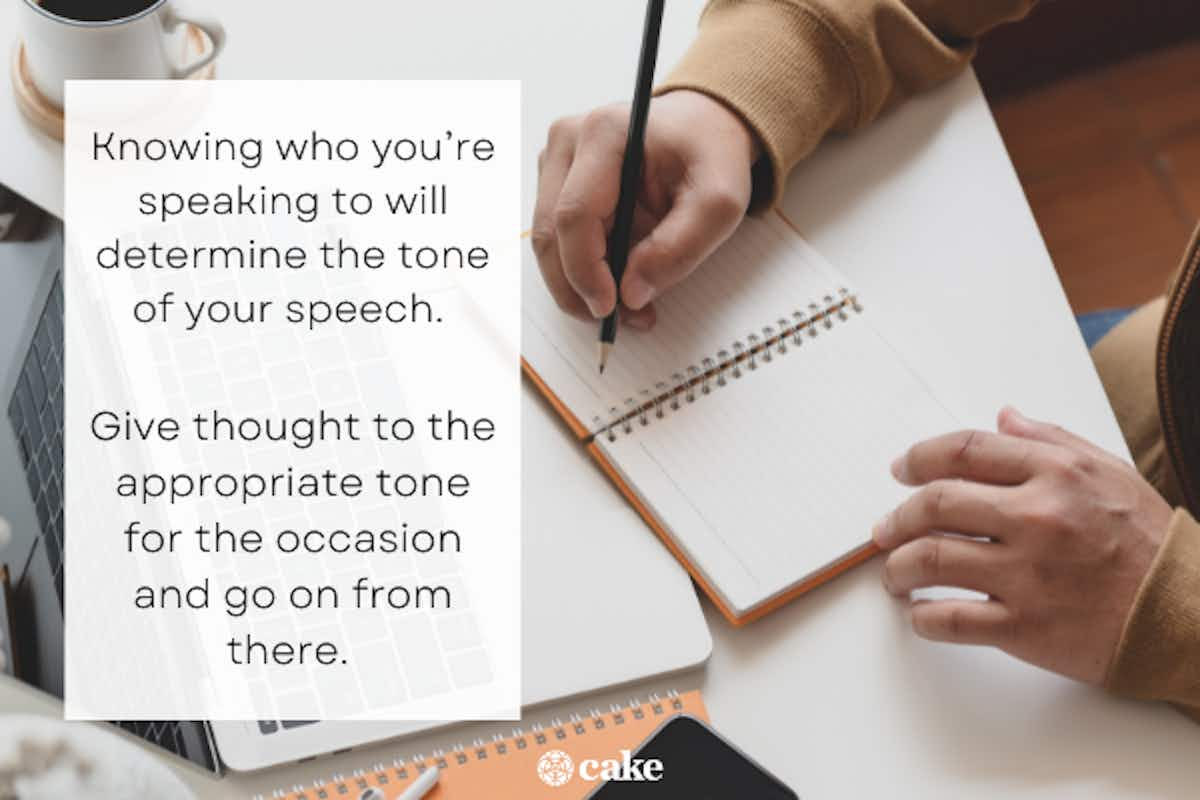
Knowing who you’re speaking to will determine the tone of your speech. If you’re giving a retirement speech or saying goodbye to a co-worker, you’ll want to be slightly more formal. It’s definitely not the right place to engage in risqué humor.
If you’re a valedictorian speaking to your classmates, strive for an uplifting and inspirational tone. If you’re eulogizing yourself at a living funeral, you can be more irreverent than you might be eulogizing someone else. Give thought to the appropriate tone for the occasion and go on from there.
Even professional writers and public speakers can’t just whip up a speech in one draft. Before you start writing, take some time to jot down some ideas.
Are there particular stories you want to share about your time with the people you’re speaking to? Make a note of them. Are there specific anecdotes about coworkers or friends you want to revisit? Write those down, too. Once you’ve narrowed down what you want to say, you’ll find it a lot easier to begin writing.
Once you’ve figured out what you want to say, it’s time to write up an outline. A speech should include the following components:
- Introduction: This will set the tone for the rest of your speech. A good introduction will grab people’s attention and keep it on you. A good introduction will include a greeting to the audience. It may also contain an icebreaker like a joke to loosen up the crowd. Finally, it will let people know the purpose of the speech.
- Body: This is the meat of your speech. In the body, you can delve into the stories and anecdotes you wrote down in your brainstorming session. You will likely be talking about a few different events, so make sure to include transitions between events.
- Conclusion: Finally, you’ll need to wrap up your speech. Most conclusions will summarize things you’ve already covered. For a farewell speech, you may want to end on a poignant note, even if the rest of your speech has been fairly lighthearted. This lends it emotional resonance.

You may want to make your speech feel perfect and polished. The problem with that is that a perfectly polished speech can end up feeling a little generic.
It’s important to infuse your speech with personal and specific stories. This will help your audience feel more connected to what you’re saying.
Once you’ve completed your speech, it’s time to edit it down. People may start to tune you out if you go on for too long. Even if your introduction is attention-grabbing, it won’t keep people engaged indefinitely. Five minutes is an appropriate length for more casual speeches. For a more formal farewell speech, you could speak for up to ten minutes. This might apply to a valedictorian speech at graduation or a retirement dinner for an important company figure.
Ultimately, you need to use your best judgment. Read your speech out loud, being sure to speak slowly and clearly enough to be understood. Factor in pauses for laughter during humorous moments. If your speech is too long, then go through and trim out any unnecessary parts. This will ensure your speech is as strong and memorable as possible.
You may think that once your speech is written, you’re all done. But there’s still one more important step. You need to be comfortable delivering your speech. This means practicing it as many times as it takes.
A lot of people will rush through speeches if they feel nervous or uncomfortable in front of a crowd. Practicing it at the correct speed will help ensure you don’t speak too fast on the actual day of a farewell event. It’s almost like muscle memory. As you practice, you can even note spots where you need to breathe or take a sip of water. Being prepared for little things like that can make you feel more confident.
Practicing can also help you memorize your speech. However, this doesn’t mean that you need to go up without cards or notes. Even the most well-prepared person can have a forgetful moment. Without notes, you may panic and go completely blank.
Keep your speech in front of you so you’re able to quickly pick up where you left off. Just don’t rely on your notes too heavily, either. You want to connect with the audience by making eye contact. Practicing and preparing can help you strike the right balance.
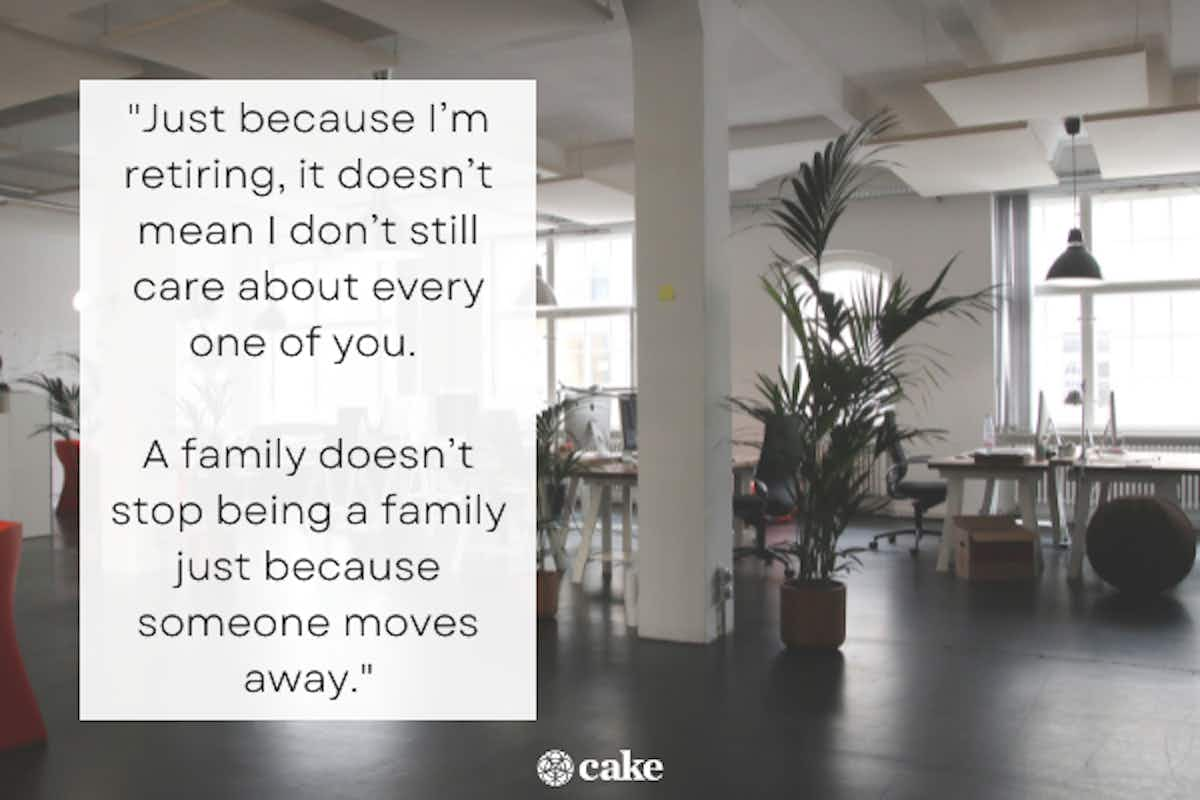
Now that we’ve broken down the steps that go into writing a farewell speech, we’ll share some examples. You can see how to say goodbye to coworkers through a touching retirement speech. You can see how people say goodbye when graduating or moving away.
You can even see how someone eulogizes themselves at a living funeral . Read on for excerpts from all of these kinds of farewell speeches:
Example for saying goodbye at work or retirement
“Over the past twenty years, I’ve seen this company grow from five people to over five hundred. But even though the office has changed significantly over the years, some things remain the same. We are truly like a family here. We’re just a much larger family than we used to be.
But just because I’m retiring, it doesn’t mean I don’t still care about every one of you. A family doesn’t stop being a family just because someone moves away. Anytime you need to talk, I’m just a phone call away.”
Example for saying farewell at the end of someone’s life
“I’ve attended an unfortunately large number of funerals in the past several years. This is the first time I’ve ever attended my own, though.
I decided to have a living funeral after burying so many of my other friends who also had terminal illnesses. I thought it was a real shame that they didn’t get to hear their friends and family members celebrate them. Perhaps selfishly, I want to hear all of you talk about how awesome I am.
But more than that, I wanted to take this opportunity to celebrate you, too. If you’re here, it’s because I can never fully express how much your support has meant to me while I’ve battled this illness. You’ve all helped me in so many ways. You’ve driven me to treatments. You’ve organized meal trains to feed my family. You’ve cleaned my house. You’ve taken care of my kids. You’ve told me jokes and let me vent. You’ve laughed with me and cried with me. You’ve been there for me in so many ways.
As you all know, we’ve hit a point where treatment isn’t doing anything to help anymore. I’ve gone ahead and discontinued it because it’s making me feel terrible and not actually doing anything. I’d rather go out peacefully and say goodbye on my own terms. And what better way to do that than throw myself a funeral party? So everyone please enjoy some food and music. And don’t forget to come over and tell me how great I am, because I do want to hear it.”
Example for students or teachers
“Over the past four years, our class has been through a lot together. We’ve had ups and downs, but no matter what, we’ve always come through it closer than ever. Maybe it’s because we’re such a small school. While we might not all be the closest of friends, we don’t have the same cliques you might find at other schools. That might also be because many of us have been in school together since kindergarten. In a lot of ways, we’ve always been like a team.
Now that we’re all going off to college, many of us will be on our own for the first time. It’s bound to be an enormous challenge for some. But I have faith in every single one of us. We’re graduating from a highly-competitive college prep school. Everything we’ve been through has prepared us for this.
We may be small fish going into a big pond. But we’re some of the smartest and toughest small fish you’re going to find. And ultimately, even if we end up scattered across the country, I know I’ll always be able to count on you. And I hope you know you can always reach out to me, too.”
Example for someone who’s moving away
“Moving away from friends isn’t exactly new for me. With a wife in the military, I end up having to pack up every few years to move. I know you all know what that experience is like. But this is definitely the hardest time I’ve ever had packing up to go.
Y ou don’t always encounter a lot of other civilian husbands living on base. It’s been incredible having a built-in support system with other dads and husbands who understand what this life is like. I’m really going to miss having our families all get together for cookouts on the weekends.”
Writing an Inspiring and Memorable Farewell Speech: Tips, Tricks, and Examples
When you’re leaving people behind, it’s hard to know how to say goodbye . You may worry that you won’t be able to properly express what the people in your life have meant to you.
Just follow the steps above and remember to speak from your heart. At the end of the day, that’s what will have the most impact.
And if you're interested in unique ways to continue someone's legacy after their passing, you can consider a custom urn from a store like Foreverence or even have a memorial diamond made from ashes with a company like Eterneva .
Categories:
- Legacy Projects
You may also like

How to Write a Meaningful Appreciation Speech

How to Write a Funeral Speech for Dad From a Daughter

How to Write a Father’s Day 2022 Speech: Step-By-Step

How to Write a Memorable Tribute Speech: Step-By-Step
- Games, topic printables & more
- The 4 main speech types
- Example speeches
- Commemorative
- Declamation
- Demonstration
- Informative
- Introduction
- Student Council
- Speech topics
- Poems to read aloud
- How to write a speech
- Using props/visual aids
- Acute anxiety help
- Breathing exercises
- Letting go - free e-course
- Using self-hypnosis
- Delivery overview
- 4 modes of delivery
- How to make cue cards
- How to read a speech
- 9 vocal aspects
- Vocal variety
- Diction/articulation
- Pronunciation
- Speaking rate
- How to use pauses
- Eye contact
- Body language
- Voice image
- Voice health
- Public speaking activities and games
- Blogging Aloud
- About me/contact
How to write a good speech in 7 steps
By: Susan Dugdale
- an easily followed format for writing a great speech
Did you know writing a speech doesn't have be an anxious, nail biting experience?
Unsure? Don't be.
You may have lived with the idea you were never good with words for a long time. Or perhaps giving speeches at school brought you out in cold sweats.
However learning how to write a speech is relatively straight forward when you learn to write out loud.
And that's the journey I am offering to take you on: step by step.
To learn quickly, go slow
Take all the time you need. This speech format has 7 steps, each building on the next.
Walk, rather than run, your way through all of them. Don't be tempted to rush. Familiarize yourself with the ideas. Try them out.
I know there are well-advertised short cuts and promises of 'write a speech in 5 minutes'. However in reality they only truly work for somebody who already has the basic foundations of speech writing in place.
The foundation of good speech writing
These steps are the backbone of sound speech preparation. Learn and follow them well at the outset and yes, given more experience and practice you could probably flick something together quickly. Like any skill, the more it's used, the easier it gets.
In the meantime...
Step 1: Begin with a speech overview or outline
Are you in a hurry? Without time to read a whole page? Grab ... The Quick How to Write a Speech Checklist And come back to get the details later.
- WHO you are writing your speech for (your target audience)
- WHY you are preparing this speech. What's the main purpose of your speech? Is it to inform or tell your audience about something? To teach them a new skill or demonstrate something? To persuade or to entertain? (See 4 types of speeches: informative, demonstrative, persuasive and special occasion or entertaining for more.) What do you want them to think, feel or do as a result of listening the speech?
- WHAT your speech is going to be about (its topic) - You'll want to have thought through your main points and have ranked them in order of importance. And have sorted the supporting research you need to make those points effectively.
- HOW much time you have for your speech eg. 3 minutes, 5 minutes... The amount of time you've been allocated dictates how much content you need. If you're unsure check this page: how many words per minute in a speech: a quick reference guide . You'll find estimates of the number of words required for 1 - 10 minute speeches by slow, medium and fast talkers.
Use an outline
The best way to make sure you deliver a perfect speech is to start by carefully completing a speech outline covering the essentials: WHO, WHY, WHAT and HOW.
Beginning to write without thinking your speech through is a bit like heading off on a journey not knowing why you're traveling or where you're going to end up. You can find yourself lost in a deep, dark, murky muddle of ideas very quickly!
Pulling together a speech overview or outline is a much safer option. It's the map you'll follow to get where you want to go.
Get a blank speech outline template to complete
Click the link to find out a whole lot more about preparing a speech outline . ☺ You'll also find a free printable blank speech outline template. I recommend using it!
Understanding speech construction
Before you begin to write, using your completed outline as a guide, let's briefly look at what you're aiming to prepare.
- an opening or introduction
- the body where the bulk of the information is given
- and an ending (or summary).
Imagine your speech as a sandwich
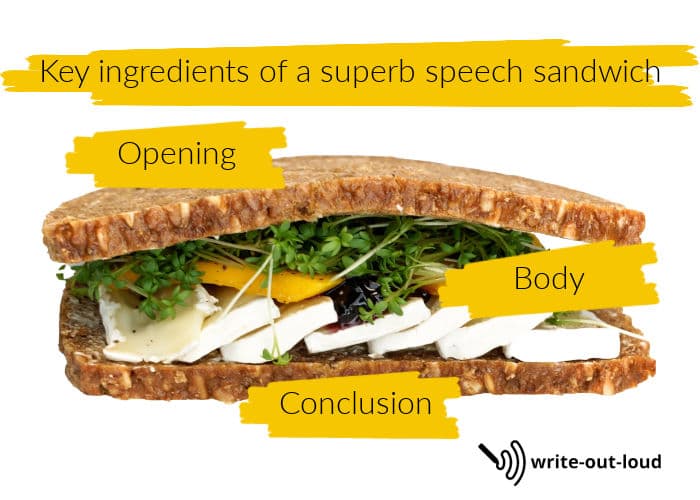
If you think of a speech as a sandwich you'll get the idea.
The opening and ending are the slices of bread holding the filling (the major points or the body of your speech) together.
You can build yourself a simple sandwich with one filling (one big idea) or you could go gourmet and add up to three or, even five. The choice is yours.
But whatever you choose to serve, as a good cook, you need to consider who is going to eat it! And that's your audience.
So let's find out who they are before we do anything else.
Step 2: Know who you are talking to
Understanding your audience.
Did you know a good speech is never written from the speaker's point of view? ( If you need to know more about why check out this page on building rapport .)
Begin with the most important idea/point on your outline.
Consider HOW you can explain (show, tell) that to your audience in the most effective way for them to easily understand it.
Writing from the audience's point of view

To help you write from an audience point of view, it's a good idea to identify either a real person or the type of person who is most likely to be listening to you.
Make sure you select someone who represents the "majority" of the people who will be in your audience. That is they are neither struggling to comprehend you at the bottom of your scale or light-years ahead at the top.
Now imagine they are sitting next to you eagerly waiting to hear what you're going to say. Give them a name, for example, Joe, to help make them real.
Ask yourself
- How do I need to tailor my information to meet Joe's needs? For example, do you tell personal stories to illustrate your main points? Absolutely! Yes. This is a very powerful technique. (Click storytelling in speeches to find out more.)
- What type or level of language is right for Joe as well as my topic? For example if I use jargon (activity, industry or profession specific vocabulary) will it be understood?
Step 3: Writing as you speak
Writing oral language.
Write down what you want to say about your first main point as if you were talking directly to Joe.
If it helps, say it all out loud before you write it down and/or record it.
Use the information below as a guide

(Click to download The Characteristics of Spoken Language as a pdf.)
You do not have to write absolutely everything you're going to say down * but you do need to write down, or outline, the sequence of ideas to ensure they are logical and easily followed.
Remember too, to explain or illustrate your point with examples from your research.
( * Tip: If this is your first speech the safety net of having everything written down could be just what you need. It's easier to recover from a patch of jitters when you have a word by word manuscript than if you have either none, or a bare outline. Your call!)
Step 4: Checking tone and language
The focus of this step is re-working what you've done in Step 2 and 3.
You identified who you were talking to (Step 2) and in Step 3, wrote up your first main point. Is it right? Have you made yourself clear? Check it.
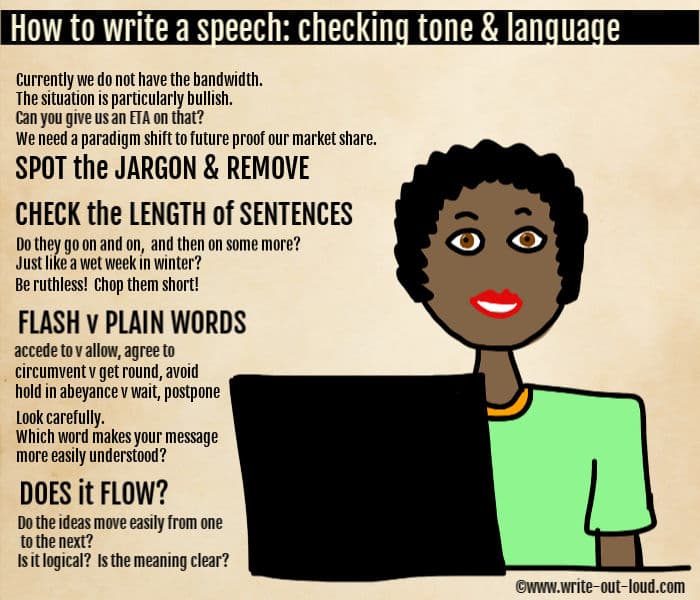
How well you complete this step depends on how well you understand the needs of the people who are going to listen to your speech.
Please do not assume because you know what you're talking about the person (Joe) you've chosen to represent your audience will too. Joe is not a mind-reader!
How to check what you've prepared
- Check the "tone" of your language . Is it right for the occasion, subject matter and your audience?
- Check the length of your sentences. You need short sentences. If they're too long or complicated you risk losing your listeners.
Check for jargon too. These are industry, activity or group exclusive words.
For instance take the phrase: authentic learning . This comes from teaching and refers to connecting lessons to the daily life of students. Authentic learning is learning that is relevant and meaningful for students. If you're not a teacher you may not understand the phrase.
The use of any vocabulary requiring insider knowledge needs to be thought through from the audience perspective. Jargon can close people out.
- Read what you've written out loud. If it flows naturally, in a logical manner, continue the process with your next main idea. If it doesn't, rework.
We use whole sentences and part ones, and we mix them up with asides or appeals e.g. "Did you get that? Of course you did. Right...Let's move it along. I was saying ..."
Click for more about the differences between spoken and written language .
And now repeat the process
Repeat this process for the remainder of your main ideas.
Because you've done the first one carefully, the rest should follow fairly easily.
Step 5: Use transitions
Providing links or transitions between main ideas.
Between each of your main ideas you need to provide a bridge or pathway for your audience. The clearer the pathway or bridge, the easier it is for them to make the transition from one idea to the next.

If your speech contains more than three main ideas and each is building on the last, then consider using a "catch-up" or summary as part of your transitions.
Is your speech being evaluated? Find out exactly what aspects you're being assessed on using this standard speech evaluation form
Link/transition examples
A link can be as simple as:
"We've explored one scenario for the ending of Block Buster 111, but let's consider another. This time..."
What follows this transition is the introduction of Main Idea Two.
Here's a summarizing link/transition example:
"We've ended Blockbuster 111 four ways so far. In the first, everybody died. In the second, everybody died BUT their ghosts remained to haunt the area. In the third, one villain died. His partner reformed and after a fight-out with the hero, they both strode off into the sunset, friends forever. In the fourth, the hero dies in a major battle but is reborn sometime in the future.
And now what about one more? What if nobody died? The fifth possibility..."
Go back through your main ideas checking the links. Remember Joe as you go. Try each transition or link out loud and really listen to yourself. Is it obvious? Easily followed?
Keep them if they are clear and concise.
For more about transitions (with examples) see Andrew Dlugan's excellent article, Speech Transitions: Magical words and Phrases .
Step 6: The end of your speech
The ideal ending is highly memorable . You want it to live on in the minds of your listeners long after your speech is finished. Often it combines a call to action with a summary of major points.

Example speech endings
Example 1: The desired outcome of a speech persuading people to vote for you in an upcoming election is that they get out there on voting day and do so. You can help that outcome along by calling them to register their support by signing a prepared pledge statement as they leave.
"We're agreed we want change. You can help us give it to you by signing this pledge statement as you leave. Be part of the change you want to see!
Example 2: The desired outcome is increased sales figures. The call to action is made urgent with the introduction of time specific incentives.
"You have three weeks from the time you leave this hall to make that dream family holiday in New Zealand yours. Can you do it? Will you do it? The kids will love it. Your wife will love it. Do it now!"
How to figure out the right call to action
A clue for working out what the most appropriate call to action might be, is to go back to your original purpose for giving the speech.
- Was it to motivate or inspire?
- Was it to persuade to a particular point of view?
- Was it to share specialist information?
- Was it to celebrate a person, a place, time or event?
Ask yourself what you want people to do as a result of having listened to your speech.
For more about ending speeches
Visit this page for more about how to end a speech effectively . You'll find two additional types of speech endings with examples.
Write and test
Write your ending and test it out loud. Try it out on a friend, or two. Is it good? Does it work?
Step 7: The introduction
Once you've got the filling (main ideas) the linking and the ending in place, it's time to focus on the introduction.
The introduction comes last as it's the most important part of your speech. This is the bit that either has people sitting up alert or slumped and waiting for you to end. It's the tone setter!
What makes a great speech opening?
Ideally you want an opening that makes listening to you the only thing the 'Joes' in the audience want to do.
You want them to forget they're hungry or that their chair is hard or that their bills need paying.
The way to do that is to capture their interest straight away. You do this with a "hook".
Hooks to catch your audience's attention
Hooks come in as many forms as there are speeches and audiences. Your task is work out what specific hook is needed to catch your audience.
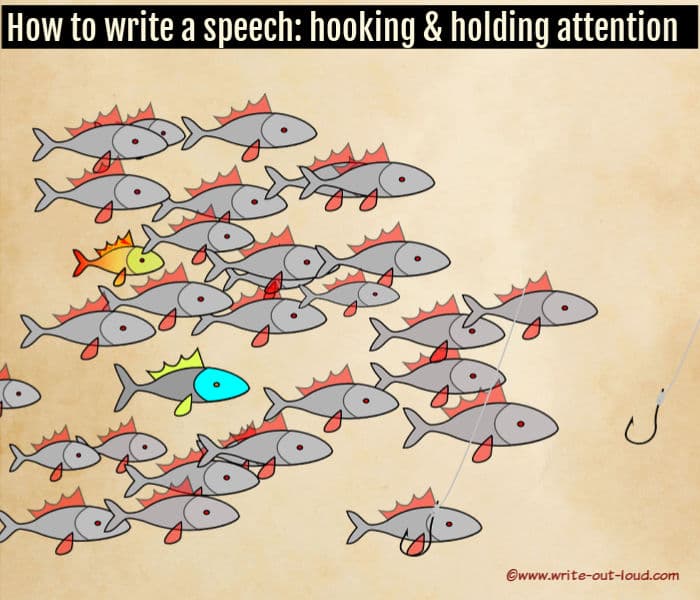
Go back to the purpose. Why are you giving this speech?
Once you have your answer, consider your call to action. What do you want the audience to do, and, or take away, as a result of listening to you?
Next think about the imaginary or real person you wrote for when you were focusing on your main ideas.
Choosing the best hook
- Is it humor?
- Would shock tactics work?
- Is it a rhetorical question?
- Is it formality or informality?
- Is it an outline or overview of what you're going to cover, including the call to action?
- Or is it a mix of all these elements?
A hook example
Here's an example from a fictional political speech. The speaker is lobbying for votes. His audience are predominately workers whose future's are not secure.
"How's your imagination this morning? Good? (Pause for response from audience) Great, I'm glad. Because we're going to put it to work starting right now.
I want you to see your future. What does it look like? Are you happy? Is everything as you want it to be? No? Let's change that. We could do it. And we could do it today.
At the end of this speech you're going to be given the opportunity to change your world, for a better one ...
No, I'm not a magician. Or a simpleton with big ideas and precious little commonsense. I'm an ordinary man, just like you. And I have a plan to share!"
And then our speaker is off into his main points supported by examples. The end, which he has already foreshadowed in his opening, is the call to vote for him.
Prepare several hooks
Experiment with several openings until you've found the one that serves your audience, your subject matter and your purpose best.
For many more examples of speech openings go to: how to write a speech introduction . You'll find 12 of the very best ways to start a speech.
That completes the initial seven steps towards writing your speech. If you've followed them all the way through, congratulations, you now have the text of your speech!
Although you might have the words, you're still a couple of steps away from being ready to deliver them. Both of them are essential if you want the very best outcome possible. They are below. Please take them.
Step 8: Checking content and timing
This step pulls everything together.
Check once, check twice, check three times & then once more!
Go through your speech really carefully.
On the first read through check you've got your main points in their correct order with supporting material, plus an effective introduction and ending.
On the second read through check the linking passages or transitions making sure they are clear and easily followed.
On the third reading check your sentence structure, language use and tone.
Double, triple check the timing
Now go though once more.
This time read it aloud slowly and time yourself.
If it's too long for the time allowance you've been given make the necessary cuts.
Start by looking at your examples rather than the main ideas themselves. If you've used several examples to illustrate one principal idea, cut the least important out.
Also look to see if you've repeated yourself unnecessarily or, gone off track. If it's not relevant, cut it.
Repeat the process, condensing until your speech fits the required length, preferably coming in just under your time limit.
You can also find out how approximately long it will take you to say the words you have by using this very handy words to minutes converter . It's an excellent tool, one I frequently use. While it can't give you a precise time, it does provide a reasonable estimate.

Step 9: Rehearsing your speech
And NOW you are finished with writing the speech, and are ready for REHEARSAL .
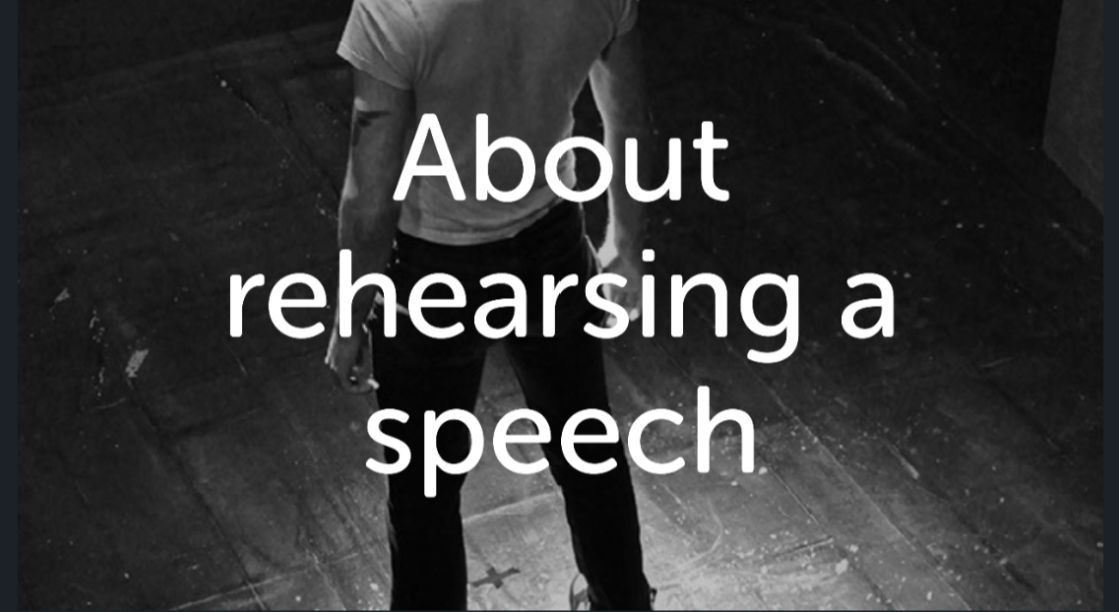
Please don't be tempted to skip this step. It is not an extra thrown in for good measure. It's essential.
The "not-so-secret" secret of successful speeches combines good writing with practice, practice and then, practicing some more.
Go to how to practice public speaking and you'll find rehearsal techniques and suggestions to boost your speech delivery from ordinary to extraordinary.
The Quick How to Write a Speech Checklist
Before you begin writing you need:.
- Your speech OUTLINE with your main ideas ranked in the order you're going to present them. (If you haven't done one complete this 4 step sample speech outline . It will make the writing process much easier.)
- Your RESEARCH
- You also need to know WHO you're speaking to, the PURPOSE of the speech and HOW long you're speaking for
The basic format
- the body where you present your main ideas
Split your time allowance so that you spend approximately 70% on the body and 15% each on the introduction and ending.
How to write the speech
- Write your main ideas out incorporating your examples and research
- Link them together making sure each flows in a smooth, logical progression
- Write your ending, summarizing your main ideas briefly and end with a call for action
- Write your introduction considering the 'hook' you're going to use to get your audience listening
- An often quoted saying to explain the process is: Tell them what you're going to tell them (Introduction) Tell them (Body of your speech - the main ideas plus examples) Tell them what you told them (The ending)
TEST before presenting. Read aloud several times to check the flow of material, the suitability of language and the timing.

- Return to top
speaking out loud
Subscribe for FREE weekly alerts about what's new For more see speaking out loud

Top 10 popular pages
- Welcome speech
- Demonstration speech topics
- Impromptu speech topic cards
- Thank you quotes
- Impromptu public speaking topics
- Farewell speeches
- Phrases for welcome speeches
- Student council speeches
- Free sample eulogies
From fear to fun in 28 ways
A complete one stop resource to scuttle fear in the best of all possible ways - with laughter.

Useful pages
- Search this site
- About me & Contact
- Free e-course
- Privacy policy
©Copyright 2006-24 www.write-out-loud.com
Designed and built by Clickstream Designs
Farewell Speech Guidelines

So you've got to get up there and say something?
Well we can't help you with the nerves, but we can help you write a farewell speech!
- Keep it short. Waffling makes it "all about you" when it should be all about them.
- Keep it real. People can tell if your speech is sincere or not. Guess which leaves a better impression?
- Keep it positive. Nobody will thank you for a negative speech!
More tips (and example speeches) below!
Farewell Toast to the Leaver
The best speeches will:
- express appreciation for the leaver’s contribution,
- include affectionate/positive descriptions of the person,
- include one or two anecdotes that show why they are so appreciated,
- express how their leaving will impact on the organisation,
- wish them well with a presentation of some kind of keepsake or gift.
Read more in this detailed breakdown .
Is the boss a bad speaker?
Take control with the managerial speech guide .
Goodbye Speech from the Leaver
This is your last chance to make your impact, and address the whole group, so try to represent yourself well!
Sure, this is easy if you're leaving a great place to work. But what if it's a job you hate?
How do you leave on a good note? Read the details here . No matter how you feel, you should:
- describe what you got out of the workplace,
- say what you will take away from your experiences there
- mention why you are leaving and how you feel,
- say what you wish for the company and the people left behind
- wish everyone the best for the future and thank them for the farewell and for your experiences there.
Now that everyone’s finished talking, start eating!
Sample Speeches from the leaver
Funny work farewell speech - leaver
These have more personality and try to use humour - don't blame the words, it's all about the delivery!
Heartfelt goodbye speech
When you are leaving town and about to rip up the bedded-in roots.
Retirement speech
For your last day of your career!
It's not the speech that is scary -
just the awkwardness of the farewell party!
Farewell Speech Top of page
- Why farewell?
- Site Agreement
- Local customs
- Picture Ideas
Extra help?
- Sad goodbyes
- Bad Goodbyes
About this site
- Share this site
- About/Contact Us
Recent Articles
Fond fare-ill - negative and ambiguous parting words..
Jun 19, 24 10:51 PM
Farewell pictures
Jun 19, 24 10:47 PM
Satisfaction Survey
Get your Countdown Calendar!
Copyright 2008-2024
All rights reserved.
Pages Protected By COPYSCAPE.COM
No liability is accepted due to the information in this website. Click here for our privacy policy.
More Than Goodbye: Your Guide to Writing a Heartfelt Farewell Speech For Teacher

Saying bye to a teacher is special. It’s a big deal whether they’re retiring or starting a new job and giving a heartfelt goodbye speech matters. I’ve made this guide to help you do it well. I’ll give you tips and examples to inspire you. Let’s make sure your speech is memorable. Ready to begin? Let’s go!
Elements Of A Memorable Farewell Speech For Teacher
Saying goodbye to a teacher who has influenced your life is a big deal. You want to express your gratitude, share your feelings, and make a lasting impression. But how do you begin?
Don’t worry! By including these key elements, you can create a farewell speech that really means something to your teacher:
- A Strong Opening : Start your speech with something catchy that makes people pay attention. You can tell a funny story, share a personal experience, or use a quote that matches the teacher’s personality or how they teach.
- A Personal Anecdote : Pepper your speech with a story that highlights a personal interaction or experience with the teacher. This can help to create an emotional connection with the audience and set the tone for the rest of the speech. For example, you could share a memory of how the teacher helped you overcome a difficult subject or inspired you to pursue your goals.
- A Sprinkle Of Humor : Lighthearted jokes or puns can add a memorable touch to your speech, but ensure they’re appropriate and respectful. Maybe poke fun at the teacher’s quirky style or fondness for groan-worthy puns.
- A Resounding Famous Quote : Consider including a touching quote or poem to further emphasize the significance of the occasion and the teacher’s impact on your life or the lives of your classmates. Explore my vast collection of quotes about teachers to find the perfect one!
- An Unforgettable Moment Of Teaching : Share how the teacher’s unique teaching approach resonated with you, perhaps their interactive methods that invigorated the classroom and cemented your understanding. Illustrate how their influence extended beyond you, positively impacting many students across the school.
- An Endearing Testimonial : Showcase the teacher’s broader impact by incorporating heartwarming stories or messages from classmates or colleagues. This tapestry of testimonials can demonstrate the breadth of their influence and diverse perspectives. Share a touching letter from an inspired student or even create an appreciation video montage encapsulating shared gratitude.
- An Acknowledgement : Expand on the teacher’s reach beyond the classroom by acknowledging their contributions to the school or community. Mention their involvement in after-school activities, clubs, or volunteer work to showcase their dedication and broader influence.
- A Well-Crafted Set Of Visuals : Incorporate compelling visuals like pictures, videos, or a slideshow to add depth and emotional resonance to your speech. Share photos of the teacher in action, showcase a cherished classroom moment through video, or use a slideshow to visually recount special memories.
- A Gratifying Thanks To The Teacher’s Family : Graciously acknowledge the teacher’s family and express your heartfelt appreciation for their unwavering support. This gesture recognizes the significant role they play in the teacher’s life and their indirect contribution to your learning journey.
- A Central Theme : Select a unifying theme for your speech, such as “gratitude,” “inspiration,” or “transformation.” This central theme will act as a thread, weaving together various elements and creating a cohesive narrative that resonates with your audience.
Crafting a memorable farewell speech for a teacher requires careful consideration of several key elements. It’s crucial to express your gratitude, share your feelings, and leave a lasting impression on someone who has significantly influenced your life.
By incorporating these elements, you can create a farewell speech that truly honors the teacher’s legacy and leaves a lasting impact. But don’t stop there! Read on to discover how to end your speech on a high note.
Ways To End Your Speech On A Positive Note
So, you’ve crafted a powerful and heartfelt message, woven with memories, humor, and appreciation. Now, let’s leave your teacher with a memorable finale:
- Reflect And Connect : Briefly summarize the key insights of your speech, connecting them back to the opening statement about the teacher’s impact.
- Express Sincere Wishes : Offer heartfelt wishes for their future endeavors, whether it’s retirement, a new chapter in their teaching career, or anything else they’re pursuing.
- Leave A Lasting Impression : Share a final thought or quote that encapsulates the essence of your message and leaves a lasting impact on your teacher. This could be a personal message, a relevant quote, or a call to action that reflects their influence.
- End With Warmth And Gratitude : Conclude with a sincere farewell and expression of gratitude. Remember, a simple “Thank you, [Teacher’s Name], for everything” can be incredibly powerful.
- Bridge The Farewell With Inspiration : Conclude by expressing your desire to stay connected, highlighting their impact, and suggesting ways (email, social media, visits) to maintain the bond. Remember, their lessons aren’t just confined to these walls, they’ll continue to inspire us as we journey on.
By following these suggestions, you can ensure your farewell speech wraps up beautifully, leaving your teacher with a smile, a warm heart, and a lasting reminder of their impact on your life.
Ideas On How To Start A Farewell Speech
At this point, you might already have a compelling speech. The problem now is how to deliver it. And it can be daunting, especially if you’re the first to speak or if the atmosphere needs warming up. Here are some ideas to kick off your speech and engage the audience:
- Quiz The Audience : Start by asking the audience some fun trivia questions about the teacher or the school. For instance, you could ask, “Who can guess how many years our beloved teacher has taught at this school?”
- Use A Prop : Introduce your speech with a prop related to the teacher or their subject area. For example, if the teacher is a math teacher, you could bring a calculator and humorously say, “I brought my calculator because I know our teacher wouldn’t want me to make any mistakes in my speech!”
- Share A Funny Story : Begin with a humorous anecdote or story about the teacher that will make the audience laugh. For instance, you could say, “Do you all remember that time when our teacher accidentally wore two different shoes to school? That was when we knew we were in for an interesting year!”
- Sing A Song : If you’re feeling bold, consider starting your speech by singing a song related to the teacher or the occasion. You could even rewrite the lyrics to a popular song to include references to the teacher or their subject area.
- Use A Joke : Kick off your speech with a joke relevant to the teacher or their subject area to set a light-hearted tone. For example, “Why did the math teacher break up with the calculator? Because it was too cheap!”
Remember to ensure that all fun ideas are appropriate and respectful to the occasion and the teacher.
Ideas On What To Do After Your Farewell Speech
Your farewell speech has ended, and you find yourself alone on the stage. Don’t worry, the show doesn’t have to stop there! Here are some fun ways to wrap up your moment in the spotlight:
- Group Photo : Conclude the speech by taking a group photo with the teacher and the audience. This creates a lasting memory and a fun way to end the occasion. You can even gift this group photo as a fun farewell present .
- Personalized Gift : Give the teacher a personalized gift that relates to their subject area or interests. This is a thoughtful way to conclude the speech and show appreciation for the teacher’s hard work.
- Thank You Card : Write a thank you card to the teacher and invite the audience to sign it. This is a heartfelt way to conclude the speech and express gratitude for the teacher’s dedication.
- Short Skit Or Play : Wrap up the speech with a short skit or play that is related to the teacher or their subject area. This entertains the audience and leaves a memorable impression.
- Gift : Ending with a farewell gift is a great idea. It gives you a chance to show your appreciation and send them off with something nice.
Choose the finale that feels most fitting. Remember, the best ending isn’t the most elaborate, but the one that resonates with your experience and leaves a genuine imprint on both your teacher and the audience. Now go forth, craft your memorable speech, and leave a lasting farewell!
Farewell Speech For A Teacher Templates And Examples
Armed with the essential elements for crafting a moving farewell speech for your teacher, dive into our collection of templates and examples tailored to various relationships. Find the perfect starting point to weave your unique tribute.
Farewell Speech For A Teacher From A Student
Good afternoon everyone,
As we gather here today to bid farewell to [Teacher’s Name], I cannot help but reflect on the impact she has had on my life and the lives of all her students. When I first entered her classroom, I was nervous, but she quickly put me at ease with her engaging and inspiring teaching style. She has helped me grow both academically and personally.
But let’s not forget, [Teacher’s Name] also knows how to have fun. One time, she dressed up as our favorite book character for Halloween, and we all had a blast trying to guess who she was. Her ability to connect with us on a personal level has made her not just a teacher, but a mentor and friend.
As we say goodbye to [Teacher’s Name], I want to express my heartfelt gratitude for all she has done for us. She has been an excellent teacher and has made a lasting impact on our lives. I will always remember the time when she stayed after class to help me with a difficult assignment, even though it was already late in the day.
[Teacher’s Name], know that you will be missed as you move on to your next adventure. You have inspired us all, and we are grateful for our time learning from you. We will miss your sense of humor and your infectious laughter.
Thank you and farewell, [Teacher’s Name].
Farewell Speech For A Teacher From A Parent
Today, we gather to say farewell to a teacher who has been an integral part of our school community for many years. [Teacher’s Name] has been a dedicated and passionate teacher, and her contributions to our school and the education of our students have been invaluable.
As [Teacher’s Name] leaves our school, we want to take a moment to express our gratitude for her service. Her commitment to her students and her subject area has been inspiring, leaving an indelible mark on our school. Her unwavering dedication to education has significantly impacted countless students’ lives, and we are all the better for having had her in our lives.
We know that [Teacher’s Name] is embarking on a new chapter in her life, and we wish her all the best in her future endeavors. Her passion for education and her love for her students will undoubtedly make her a valuable asset to any institution lucky enough to have her.
[Teacher’s Name], as we bid you farewell, we want to thank you for your unwavering dedication to our school and the education of our students. Your legacy will live on, and we will always remember the impact that you have had on our lives.
Farewell Speech For A Teacher From A Principal
Dear colleagues and friends,
Today, we gather to bid farewell to a teacher who has been a cornerstone of our school community for many years. As [Teacher’s Name] prepares to embark on the next chapter of her life, I want to take a moment to express my gratitude for her service and to share a few memories.
I remember when [Teacher’s Name] first joined our school. She was passionate about her subject area and had many innovative ideas for engaging her students. I knew right away that she would be an incredible asset to our school community. Over the years, I have watched her grow and develop as an educator, and I have been so proud to call her a colleague and friend.
[Teacher’s Name], you have inspired us all. Your dedication to your subject area and your students has been unwavering, and your passion for education has been infectious. Your commitment to your craft has challenged and motivated your students to reach their full potential, and you have always gone above and beyond to ensure that they receive the best possible education.
As you prepare to leave our school, know that you will be deeply missed. Your impact on our community will be felt for years to come, and we are all better for having had you in our lives. Your legacy will live on in the countless students whose lives you have touched, and in the colleagues whose lives you have enriched.
As we say goodbye to [Teacher’s Name], I am reminded of the old saying: ‘Those who can, do. Those who can’t teach. And those who really can’t become principals.’ But in all seriousness, [Teacher’s Name] has been an incredible teacher and an asset to our school community. We will miss you dearly and wish you all the best in your future endeavors.
Good luck, [Teacher’s Name], and farewell.
Farewell Speech For A Teacher From A School Staff
Hey [Teacher’s Name],
As you say your goodbyes and embark on your next adventure, we in the support staff wanted to chime in and share our appreciation for everything you’ve brought to our school community.
Let’s be honest, teachers get most of the limelight, but folks like us wouldn’t be able to do our jobs without incredible colleagues like you. Your infectious enthusiasm and can-do spirit made navigating even the craziest days easier, and your creative solutions to problems often left us in awe.
You had a true gift for connecting with everyone, not just the students. You always took the time to say hello, ask about our day, and lend a helping hand (or ear) when needed. We’ll miss catching up in the copy room or sharing stories between lunch breaks.
Of course, we can’t ignore the impact you’ve had on our young learners. You fostered a warm and inclusive environment where they felt comfortable, supported, and encouraged to grow. From helping with field trips to lending a hand during lunch duty, you went above and beyond.
While we’re sad to see you go, we know you’re onto amazing things. Keep in touch, let us know how you’re doing, and remember—the door is always open if you ever need a friendly face or a listening ear.
All the best in your next chapter!
Farewell Speech For A Teacher From A Coteacher
As we gather here today, I am filled with mixed emotions as I bid farewell to a remarkable colleague and friend. [Teacher’s Name], your departure leaves a void that will be difficult to fill, but it also marks the beginning of an exciting new chapter in your life journey.
Reflecting on our time together, I am reminded of the countless moments we shared in the classroom. Your dedication, passion, and unwavering commitment to our students have left an indelible mark on each of us. Your innovative teaching methods, boundless enthusiasm, and genuine care for the well-being of our students have inspired me and everyone around you.
Beyond the classroom, your kindness, generosity, and sense of humor have created a warm and supportive environment for us all. Whether it was lending a listening ear, offering words of encouragement, or simply sharing a laugh during break time, your presence has made every day brighter.
As you embark on this new chapter of your life, I want to express my deepest gratitude for your guidance, mentorship, and friendship. Your legacy will continue to inspire us long after you’ve left these halls.
While we will miss you dearly, we take comfort in knowing that your impact will be felt far and wide. Wherever your journey takes you, know that you carry with you the love, admiration, and respect of everyone whose lives you’ve touched.
On behalf of our students, fellow teachers, and staff, I extend our heartfelt wishes for success, happiness, and fulfillment in all your future endeavors. May your path be filled with endless opportunities, and may you continue to touch lives and make a difference wherever you go.
Thank you, [Teacher’s Name], for being an extraordinary teacher, colleague, and friend. You will always hold a special place in our hearts.
Wishing you all the best.
Thank You Speech For Retiring Or Leaving Teachers
If you’re a teacher yourself and want to bid farewell to your students, co-teachers, school staff, parents, and principal, preparation is key. While incorporating the same elements mentioned earlier, shift the focus from yourself to the audience you’re addressing. Here’s a template to get you started:
Dear students, colleagues, parents, and our esteemed principal,
As I stand before you today, emotions tangle within me. Excitement flutters for the next chapter, yet a bittersweet ache lingers for the memories and connections forged here. This farewell marks not just my departure, but the culmination of a journey shared with many.
First and foremost, to my dear students: you are the reason I stand here today, your enthusiasm and growth fueling my passion. Thank you for the laughter, the challenges, and the moments of pure joy you brought to my classroom. You haven’t merely learned facts and figures; you’ve grown into individuals brimming with potential, and that’s the greatest reward a teacher can seek.
Remember that nervous freshman I was, stepping into this building for the first time? My mentors, these very teachers I now call colleagues, guided me with compassion and wisdom. Every lesson and shared experience, has shaped me into the educator I am today.
A special memory flickers into my mind. [Share a personal anecdote about a colleague who impacted you deeply.] This, my friends, is the essence of our profession—dedicating ourselves to nurturing not just students, but each other.
And to the parents, your unwavering support has been invaluable. Thank you for entrusting your precious children to us, for encouraging their curiosity, and for collaborating in their education.
But let’s face it, being a teacher isn’t always sunshine and roses. We’ve all laughed till we cried at the sight of homework mistakes (some suspiciously familiar!) But remember, behind those frustrated moments lies a deeper truth—we wouldn’t trade these experiences for anything.
As I depart, I leave you with this: the impact of a teacher extends far beyond the classroom walls. You, my students, carry a piece of our hearts with you, just as we hold yours. Go forth, chase your dreams, and remember the lessons learned within these walls, both academic and personal.
Though bittersweet, this goodbye marks a new beginning. To my colleagues, cherish the laughter and camaraderie. To the parents, continue nurturing your children’s potential. And to my beloved students, soar high, for the world awaits your brilliance.
With heartfelt gratitude and a touch of humor, I bid you farewell. Please, don’t miss me too much – you’re finally free!
Thank you, and goodbye.
Frequently Asked Questions (FAQs)
You may still have lingering questions after reading or skimming all the sections above, and that’s perfectly normal! Here’s an FAQ section to further provide the information you need.
How Long Should My Speech Be
Aim for 3–5 minutes. You want to be memorable, not marathon-like. Think concise, clear points delivered with genuine emotion.
What Tone Should I Use
Let your relationship and the occasion guide you. Respectful is always a must, but you can weave in heartfelt stories, sprinkle in lighthearted humor (ensure it’s teacher-appropriate!), or go truly inspirational. Pick a tone that feels authentic to you and your connection with the teacher.
What Personal Stories Should I Share
Focus on anecdotes that showcase the teacher’s impact, be it on you, classmates, or even the school community. Choose stories with specific moments and emotions that paint a vivid picture of their influence. Did they help you overcome a challenge? Inspire a passion? Share that vulnerability and genuine impact.
What Visuals Can I Use
Photos, videos, or a slideshow can elevate your speech, but keep it high-quality and relevant. A picture of the teacher in action, a short video clip of a cherished classroom moment, or a slideshow visually recounting special memories can leave a lasting impression.
How Can I Avoid Clichés
Be authentic! Use your own voice and express your genuine feelings. Share personal anecdotes and specific memories instead of relying on overused phrases. People connect with real emotions, not platitudes.
What If I Get Emotional During The Speech
It’s completely natural to feel emotional! Embrace your feelings, they show the genuineness of your message. Take a deep breath, pause if needed, and remember that vulnerability can be incredibly powerful.
What If I Forget My Speech During Delivery
Don’t panic! Take a moment to regroup. You likely remember the key points and anecdotes. Improvise or rephrase, the audience will appreciate your honesty. Even seasoned speakers forget lines, what matters is your sincerity.
Is It Okay To Practice In Front Of Others
Yes! Practicing in front of trusted friends or family can help you gain confidence and refine your delivery. Get feedback on pacing, clarity, and emotional impact. Remember, practice makes perfect (or at least, polished!)
Do I Need To Prepare A Physical Copy Of My Speech
It’s a personal preference. Having notes or key points written down can be a safety net, but avoid rigidly clinging to a script. Focus on connecting with the audience and your spoken words.
Should I Record My Speech For The Teacher Later
If they’re unable to attend or want to cherish the moment, consider recording your speech afterward. This allows them to relive the emotions and share them with loved ones who couldn’t be there.
This guide has hopefully equipped you with inspiring tips and captivating examples to craft a memorable farewell speech. Remember, authenticity is key. Let your genuine appreciation and personal anecdotes shine through.
If you’d like to learn more about retiree life and saying farewells, you might want to read my other articles on this site. Here are some of them:
- 10 Tips To Transition From Work To Retirement
- 16 Interesting Activities For Retirees
- How Amazingly Far Is A 70-Year-Old Senior’s Walking Distance
- 70 Heartwarming And Appreciative Retirement Toasts For Everyone
- 45 Engaging Retirement Hobbies for Every Interest
Happy reading!
My wife and I quit the rat race and retired in 2021. We RV'ed around the US for a couple of years and now we're slow traveling outside the US!
Recent Posts
2024 Retirement Statistics: A Quick Look
Are you looking for detailed information about retirement? You've come to the right place. This page compiles extensive statistical information related to retirement, retirees, and seniors, gathered...
Retirement Party Etiquette And Considerations: Common Frequently Asked Questions Answered
Retirement parties often spark numerous questions among individuals. You might find yourself pondering about retirement party etiquette, rules, processes, and considerations surrounding such...
- Skip to main content
- Skip to secondary menu
- Skip to primary sidebar
- Skip to footer
A Plus Topper
Improve your Grades
Farewell Speech for Teacher | Farewell Speeches for Teacher by Students in English
February 8, 2024 by Prasanna
Farewell Speech for Teacher: Almost every time, we used to celebrate people’s departure rather than their arrival. With these farewell speeches for teachers by students, you will get to know how to bid a proper farewell to a well-deserved teacher. In this article, we will guide you on what to write to wish your teacher all the best in life after teaching career. Your teacher leaving the schools might have inspired you who you are today.
Apart from gifts, farewell speech for teachers by students can illustrate their values and ethics. Moreover, it would remain in the heart of students and the school. Be it for a teacher who is leaving the school for relocation or who is retiring. Therefore, they deserve written farewell speech for the moving or retiring teacher by their students.
Let your teacher know how you feel for their hard work. Then again, show your gratitude and appreciation for your teacher to memorable in the school.
Students can also find more English Speech Writing about Welcome Speeches, Farewell Speeches, etc
Long and Short Farewell Speeches for Teacher in English
In this article, check out the samples of farewell speech for teachers. You don’t have to worry about the language of the speech as it is very simple. The speeches will mainly focus on the essence of farewell speech for teachers. Long speech on farewell speech for teachers is helpful for students of classes 7,8,9 and 10. Short speech on farewell speech for teachers is helpful for students of classes 1,2,3,4,5 and 6.

Long Speech on Farewell Speech for Teacher by Students
Good morning respected principal, teachers, and my fellow students.
Here I feel grateful to deliver this farewell speech on such an outstanding day like this. We are all here to bid goodbye to our valuable high teacher, who retired from the active position. Today, I realized how time and valued moments fly.
I feel the honor to say that we must respect all the valuable skills and knowledge. Our teacher had offered everything to the students to make future leaders. Also, we must thank him for all his efforts, sincerity, and hard work for teaching with great patience.
He has been in this respected position and service for over thirty (mention the years of that teacher) years now. He had spent imparting the right knowledge and skills onto the students appropriately. He is sincere, responsible, well respected, and highly esteemed in the teaching profession. We always believe that he is an achiever, generous, modest, and open-minded teacher. However, we respect the fact that he had to be helpful to all the students in some way.
We feel grateful when some of us were facing some challenges; you stood with us and motivated to meet the challenges. Also, he gave strong encouragement and motivation every time to the students. In such a case, he had built the future leaders and made everyone the best. Sir, with your experience in facing hard situations, we were able to overcome some of the difficulties.
Throughout his career in the school, he was an excellent teacher and responsible for his commitments in promoting the best techniques in the teaching sector. Sir, your outstanding qualities have inspired everyone.
Thank you, for everyone for the opportunity. Farewell Teacher!
Short Speech of Farewell for Teacher in English
Good morning to the respected principal, teachers, and all dear teachers and my fellow students. We have gathered here to celebrate Mr. (Name of the teacher)’s farewell party. Today. Here we have been gathered to bid goodbye or farewell to our highly valued teacher.
However, this is an excellent opportunity to offer thanks for how our teacher. He has so much expertise and passed across some unique skills to the students. Though it is is very sad for bidding goodbye to someone who has become more of a father. But we still need to use this chance to demonstrate our gratitude to him.
The 30 years he had spent offering the best and right skills onto the students. He is a great counselor in the teaching profession. Also, he makes the students push their limits in solving the difficulties. We appreciate when the students were facing challenges, he stood with us. He has indeed produced a generation of scholars that was strong. Balancing all the abilities and skills of life with education, it seems the school is more than just construction. In fact, the school building became a citadel of knowledge and wisdom for the students.
Being a beneficiary of awards is not a simple thing below your knowledge, contributions, and abilities. In fact, you deserve more for your efforts that you had out in the teaching profession. We are so grateful that you have taught with sincerity, passion, and zeal. Thank you for making the class not boring and realize that learning is essential in life. Of course, you knew how to capture the student’s attention.
Sir, you have put all your efforts into infusing such patience onto the students. We hope that you get a life a happy moment with a lot of sweet memories with your whole family. We also pray that the skills we students have gained from you are used in building a great nation.
You have remained the most favorite, and I believe that your fame in our schools never ends. We wish you all the best teachers for your future life after the school profession. Also, you have been an inspiration to many of us in the school.
Thank you for your patience and efforts, Sir. Your family can have more time and fun with you now. Also, we believe that you know your students always love to hang out with you. No one can erase your professionalism, affectionate gestures, and sweetness to us that are engraved on our hearts. On behalf of our whole school present here today, we wish your life is the best.
FAQ’s on Farewell Speech for Teacher
Question 1. How to start the farewell speech for the teacher?
Answer: Try to follow these points to make your farewell speech the best.
- Initially, greet the audience.
- Greeting the attention of your audience
- Building a rapport between you and the audience
- Orienting the audience about the purpose of the gathering.
- Finally, the tone of the speech
The body of the speech includes:
- Factual experiences should be shared
- A positive message should be passed
- The outstanding contributions and achievements made to the school by that particular teacher.
- The duration of that teacher has spent
- Dont forget to add some humor in your farewell speech
Question 2. What are some tips for the best farewell speech to the teacher by teachers?
Answer: Remember, there is no specific formula for giving a farewell speech to teachers in the school. But here are some tips to deliver your farewell speech to your teacher.
- Share your experiences with that teacher, who is leaving the school or retiring
- Reveal gratitude and offer thank you
- Always keep it short and sweet
- Make it original
Question 3. What are the ways to start a farewell speech without saying good morning?
Answer: Some of the best ways to start a speech are:
- Tell a personal story
- Ask a question
- Quote a powerful teacher
- Tell the audience to imagine
- Picture Dictionary
- English Speech
- English Slogans
- English Letter Writing
- English Essay Writing
- English Textbook Answers
- Types of Certificates
- ICSE Solutions
- Selina ICSE Solutions
- ML Aggarwal Solutions
- HSSLive Plus One
- HSSLive Plus Two
- Kerala SSLC
- Distance Education

Sara Swann, PolitiFact Sara Swann, PolitiFact
Leave your feedback
- Copy URL https://www.pbs.org/newshour/politics/fact-checking-attacks-on-walzs-military-record-by-vance-and-other-republicans
Fact-checking attacks on Walz’s military record by Vance and other Republicans
This fact check originally appeared on PolitiFact .
Republican vice presidential nominee and Ohio Sen. J.D. Vance sought to negatively frame the 24-year military career of newly minted Democratic vice presidential candidate Tim Walz, Minnesota’s current governor.
“When the United States Marine Corps, when the United States of America, asked me to go to Iraq to serve my country, I did it,” Vance said Aug. 7 at the Shelby, Michigan, police department. Vance served as a combat correspondent for the U.S. Marine Corps from 2003 to 2007 and deployed to Iraq for six months in 2005 but did not experience combat .
Vance continued, “When Tim Walz was asked by his country to go to Iraq, do you know what he did? He dropped out of the Army and allowed his unit to go without him. … I think it’s shameful.” At a different event, Vance used the phrase “ stolen valor ” to describe his accusations against Walz.
On X, Rep. Ronny Jackson, R-Texas, made a claim similar to Vance’s, writing, “Tim Walz TURNED HIS BACK on the soldiers in his unit because he was TOO afraid to deploy to Iraq!!”
READ MORE: Democrats defend Walz’s military record as Vance, GOP begin attacks
Walz retired from the Minnesota National Guard in May 2005. He had submitted retirement paperwork five to seven months beforehand, Fox News reported , citing the Minnesota National Guard.
In March 2005, Walz’s battalion had been notified about a possible deployment to Iraq within two years, Walz’s congressional campaign said in a news release that month, citing the National Guard Public Affairs Office. The Minnesota National Guard said the battalion then received an official order about mobilizing for deployment to Iraq in July 2005, after Walz retired.
Vance’s statement misleads by distorting the timeline. Walz had not been “asked by his country to go to Iraq,” as Vance said. He had been given a two-year window for a potential, not definite, deployment. And the official deployment notice came after Walz’s retirement.
Walz has said since before his Army retirement that he left to run for Congress. He filed his candidacy paperwork in February 2005, before the March 2005 notification about the potential deployment.
This is not a new line of attack. When Walz ran for a second term as Minnesota governor in 2022, his Republican opponent, who did not serve in the U.S. military, criticized Walz for leaving the National Guard before his unit deployed to Iraq.
Two retired Minnesota National Guard command sergeant majors also penned a paid letter to a Minnesota newspaper in 2018 claiming Walz “embellished and selectively omitted facts” about his military service. This letter resurfaced on X after Vice President Kamala Harris tapped Walz as her running mate. Other guard members who served with Walz have defended him.
Walz’s spokesperson in the Minnesota governor’s office did not respond to a request for comment, and the Harris-Walz campaign declined to comment.
When reached by The New York Times , a Harris-Walz campaign spokesperson didn’t provide new details about Walz’s retirement timeline and instead highlighted Walz’s record advocating for veterans and their families.
When contacted for comment, Vance’s campaign spokesperson sent links to the 2005 Walz campaign news release about the potential deployment and several news stories that quote former members of Walz’s battalion who were upset with him for not deploying to Iraq.
Walz’s military timeline
Walz enlisted in the Nebraska National Guard on April 8, 1981, two days after his 17th birthday. In 1996, Walz transferred to the Minnesota National Guard, where he served in the 1st Battalion, 125th Field Artillery until he retired May 16, 2005, Army Lt. Col. Kristen Augé, Minnesota National Guard’s state public affairs officer, told PolitiFact in a statement.
During his service, Walz responded to floods and tornadoes, specialized in heavy artillery and was recognized for his proficiency in sharpshooting and hand grenades, Minnesota Public Radio reported .
On Aug. 3, 2003, Walz and his battalion were deployed to Italy to support U.S. operations in Afghanistan under Operation Enduring Freedom. Walz returned to Minnesota in April 2004, Augé said.
WATCH: A look at Walz’s record and how he could bolster Democratic support in the Midwest
In May 2005, Walz, then 41, officially retired from the Minnesota National Guard to campaign for Minnesota’s 1st Congressional District. He filed his statement of candidacy paperwork with the Federal Election Commission on Feb. 10, 2005. Walz was elected to Congress in November 2006.
Al Bonnifield, who served with Walz in the Minnesota National Guard, told Minnesota Public Radio in 2018 that Walz weighed his retirement from the guard and congressional run “very heavy.” Bonnifield reiterated this to The Washington Post on Aug. 7.
“Would the soldier look down on him because he didn’t go with us? Would the common soldier say, ‘Hey, he didn’t go with us, he’s trying to skip out on a deployment?’ And he wasn’t,” Bonnifield said in 2018.
Doug Julin, who served as a more senior command sergeant major in Walz’s battalion, said Walz went over his head to get retirement approval before the unit’s deployment was official, because Julin would have “analyzed it and challenged him,” the New York Post reported Aug. 8.
Others who served in Walz’s battalion have said he “ditched” them and his actions were “dishonorable,” Fox News reported .
Battalion’s deployment to Iraq
Walz’s unit received an “alert order” for mobilization to Iraq on July 14, 2005, Army Lt. Col. Ryan Rossman, Minnesota National Guard’s director of operations, told PolitiFact in a statement.
The unit received the official Department of the Army mobilization order Aug. 14, 2005, and mobilized Oct. 12, 2005, Rossman said.
The unit deployed to Iraq in March 2006 and was deployed for 19 months, according to an October 2007 congressional resolution .
The two retired Minnesota National Guard command sergeant majors who wrote the 2018 letter said the battalion received a “warning order” in early 2005 “to prepare to be mobilized for active duty for a deployment to Iraq.” They did not specify the warning letter’s date. Augé of the Minnesota National Guard told PolitiFact the agency doesn’t have information about any unofficial orders that might have been sent to the battalion.
An archived March 20, 2005, press release from Walz’s congressional campaign website said the National Guard Public Affairs Office announced March 17, 2005, “a possible partial mobilization of roughly 2,000 troops from the Minnesota National Guard.” The announcement said a portion of Walz’s battalion could be mobilized to serve in Iraq within the next two years.
Walz said in his campaign’s press release, “As Command Sergeant Major I have a responsibility not only to ready my battalion for Iraq, but also to serve if called on. I am dedicated to serving my country to the best of my ability, whether that is in Washington, D.C., or in Iraq. I don’t want to speculate on what shape my campaign will take if I am deployed, but I have no plans to drop out of the race.”
Although Walz had been promoted in 2004 to command sergeant major, he retired in 2005 as a master sergeant, one rank below command sergeant major, “for benefit purposes because he did not complete additional coursework at the U.S. Army Sergeants Major Academy,” Augé said.
Joseph Eustice, a 32-year military veteran who served in and led the same guard unit as Walz, told The New York Times and NewsNation in Aug. 7 interviews that when Walz decided to retire in May 2005, their unit had heard rumors of a potential deployment to Iraq, but had not received official orders.
Vance said, “When Tim Walz was asked by his country to go to Iraq, do you know what he did? He dropped out of the Army and allowed his unit to go without him.”
Vance’s statement ignores that Walz’s unit was not officially ordered to go to Iraq until July 2005, two months after Walz officially retired.
After 24 years of military service, Walz said he retired from the Minnesota National Guard in May 2005 to run for Congress. He had submitted retirement paperwork five to seven months beforehand. He filed candidacy paperwork in February 2005.
READ MORE: 5 things to know about Tim Walz, Kamala Harris’ VP pick
There’s an element of truth in Vance’s statement because in March 2005, before Walz officially retired, his battalion was notified of possible deployment to Iraq within two years. Walz was aware at the time of his retirement that deployment could be possible and one of his fellow guard members described Walz’s retirement decision as “very heavy.”
But the March 2005 notification gave a time frame of two years for a possible — not definite — deployment that would not occur immediately, which is the way Vance’s statement framed it.
At PolitiFact, the burden of proof is on the speaker, Vance, who did not provide details to support his statement. We rate it Mostly False.
PolitiFact Researcher Caryn Baird contributed to this report.
Support Provided By: Learn more
Educate your inbox
Subscribe to Here’s the Deal, our politics newsletter for analysis you won’t find anywhere else.
Thank you. Please check your inbox to confirm.

Talk to our experts
1800-120-456-456
- Leave Application for School: Format with Samples

How to Write Leave Application for School for Different Reasons?
Crafting a clear and professional leave application is essential for students needing time away from school. This page provides straightforward instructions and practical samples to help you write an effective leave application. Learn how to format your letter, include details, and ensure your request is communicated clearly and respectfully. Whether you need leave for personal reasons, medical issues, or family commitments, these tips and examples will help you create a well-structured application that meets school requirements.

Some Useful Tips to Make Your Leave Application Effective |
| . |
Format of Writing a Leave Letter for School
Follow the formal letter format for leave letters. Use professional and respectful language throughout.
Recipient’s Address : Start with the address of the person you are writing to.
Date : Include the date the letter is written.
Subject : Clearly state the purpose of the letter in the subject line.
Salutation : Use a polite and appropriate salutation.
Body : Mention the reason for the leave and the duration in a clear manner.
Tone : Maintain a neutral and straightforward tone.
Clarity : Be concise and avoid long, confusing sentences.
Proofreading : Check for spelling and grammatical errors before submission.
Attachments : Include any necessary documents, such as medical certificates if needed.
Here's a format for writing a leave letter for school which ensures clarity and covers all essential details:
(Your Name) (Your Address) (City, State, ZIP Code) (Email Address (if applicable)) (Date)
(Recipient's Name (usually the Principal or Teacher)) (School's Name) (School's Address) (City, State, ZIP Code)
Subject: Leave Application
Dear (Recipient's Name),
I am writing to request leave from school for (number of days) days, starting from (start date) to (end date). The reason for my leave is (briefly state the reason, e.g., a family function, medical treatment, personal reasons).
I have ensured that I will complete all my pending assignments and will catch up on any missed work during my absence. I will also make sure to get notes from my classmates to stay updated with the lessons covered during this period.
I kindly request you to grant me leave for the mentioned period. Thank you for considering my application. I look forward to your positive response.
Yours sincerely, (Your Name) (Class/Grade)
Sample Leave Applications for School
If you need to write a letter to the principal requesting leave, here's how to approach it. Keep your application concise and sincere, and include sufficient details to explain the reason for your absence. Review the sample leave applications provided below to understand the proper format for crafting a school leave request.
Leave Application 1 – School Leave Letter Format – Sick Leave
The Principal
DAV Matriculation Higher Secondary School
Mysore – 570045
8th August 2024
Subject : Sick Leave Application
I am writing to inform you that I am unwell and unable to attend school. I have been diagnosed with flu and a severe cold and have been advised by my doctor to rest at home for 7 days. Therefore, I request sick leave from 8th August to 14th August.
I have attached a medical certificate from my doctor for your reference. I assure you that I will make up for any missed assignments and classwork as soon as I return. I will also reach out to my classmates for any notes and updates.
Thank you for your understanding and support.
Yours sincerely, Vineet Class VIII
Leave Application 2 – Leave Letter to Principal – To Participate in the National Level Literary Competition
High Angels Public School
Bangalore – 560102
25th August, 2020
Subject : Leave application participating in the National Level Literary Competition
Respected Ma’am,
I am Saksham Arora, a student of Class X C. I have won first place in the Elocution competition and have been selected for the next level of competitions that will be held in Coimbatore. The National Level Competition will be held from the 3rd to the 7th of August. I will have to report to the venue at 9 am on August 3rd.
I request you to kindly grant me leave for a week (2.08.2024 – 8.08.2024). I will make sure to take note of all the lessons and complete the work that will be given during my absence.
Thanking you
Yours faithfully,
Leave Application 3 – Letter to Principal for Leave – Going Out of Station
Perks Matriculation Higher Secondary School
Coimbatore – 641056
Subject: Application for Leave to Go Out of Station
Dear Mrs. Preet,
I am writing to request leave from school as I will be out of the station with my family. We are planning to visit Goa from the 14th of August to the 19th of August fora family vacation.
I kindly request you to grant me leave for these days. I will ensure to catch up on all missed assignments and classwork upon my return. I will also coordinate with my teachers to keep up with any important lessons covered during my absence.
Thank you for considering my request. I look forward to your positive response.
Yours sincerely, Gargi Class IX E
Takeaways from This Page
Leave applications are formal requests to be absent from school or work for specific reasons and must be presented in a structured and professional manner.
A complete leave application includes your address, the date, recipient’s address, subject line, salutation, body of the letter, closing, and your signature.
Always include the reason for your leave, the exact dates, and any relevant documentation, such as a medical certificate if applicable.
Use formal language and a respectful tone throughout the application to ensure professionalism.
Submit your leave application as early as possible to allow adequate time for approval and any necessary adjustments.
Exercises for Students to Try
Exercise 1: personal leave application.
Instructions: Write a leave application to your school principal requesting leave for personal reasons.
Details to include:
Your name and class
Dates of leave
Reason for leave (personal)
Request for approval
Exercise 2: Medical Leave Application
Instructions: Draft a leave application to your school principal for medical reasons.
Medical reason
Mention of a medical certificate if applicable
Exercise 3: Leave for Family Function
Instructions: Write a leave application to your school principal requesting leave to attend a family function.
Reason for leave (family function)
Exercise 4: Leave for a School Trip
Instructions: Write a leave application to your school principal to request leave for a school trip organized by another institution.
Reason for leave (school trip)
Exercise 5: Leave for Exam Preparation
Instructions: Write a leave application to your school principal requesting leave for exam preparation.
Reason for leave (exam preparation)
Ideas for the Exercises:
Exercise 1:.
Dear Principal (Principal’s Name),
(School Name and Address)
I am (Your Name) from class (Your Class). I am writing to request leave from (Start Date) to (End Date) due to personal reasons. I would appreciate your approval for this leave.
Thank you for your understanding.
(Your Name)
Exercise 2:
I am (Your Name) from class (Your Class). I am writing to inform you that I will need to take leave from (Start Date) to (End Date) due to medical reasons. I have attached a medical certificate for your reference.
Thank you for your consideration.
Best regards,
Exercise 3:
I am (Your Name) from class (Your Class). I would like to request leave from (Start Date) to (End Date) to attend a family function. I hope you will grant me this leave.
Yours sincerely,
Exercise 4:
I am (Your Name) from class (Your Class). I am writing to request leave from (Start Date) to (End Date) to participate in a school trip organized by (Name of Organizing Institution). I would be grateful if you could approve my leave for this purpose.
Thank you for considering my request.
Exercise 5:
I am (Your Name) from class (Your Class). I am requesting leave from (Start Date) to (End Date) to prepare for my upcoming exams. Your approval would greatly assist me in my preparation.

FAQs on Leave Application for School: Format with Samples
1. What is a leave application?
A leave application is a formal letter or email requesting permission to be absent from school or work for a specific period due to various reasons like personal, medical, or family matters.
2. What should be included in a leave application?
A leave application should include your name, position or class, the dates of your requested leave, the reason for your leave, and a polite request for approval.
3. How should I address a leave application?
Address your leave application to the appropriate authority, such as your school principal, HR manager, or immediate supervisor, using their formal title.
4. What is the proper format for a leave application?
The format should include your address, date, the recipient's address, subject line, salutation, body of the letter, closing, and your signature.
5. How do I request sick leave application for school?
For medical leave, mention the reason for your absence and include details such as the dates you will be away. Attach a medical certificate if required.
6. Can I request leave for a family function?
How far in advance should I submit a leave application? It is best to submit your leave application as early as possible to allow sufficient time for approval and any necessary adjustments.
7. What if I need to take emergency leave?
Is it necessary to provide a reason for my leave? Providing a reason for your leave helps the recipient understand the purpose and urgency of your request, which can facilitate approval.
8. How do I follow up on my leave application?
If you do not receive a response within a reasonable time, follow up with a polite reminder to ensure your application has been reviewed.
9. Can I cancel or modify my leave request?
Yes, if you need to cancel or modify your leave request, inform the recipient as soon as possible and provide details about the changes.
10. What should I do if my leave application is denied?
If your leave application is denied, discuss the reason with your authority and see if alternative arrangements or dates can be considered.
11. How should I conclude a leave application?
Conclude your leave application with a polite thank you and a request for approval. Use a formal closing such as "Sincerely" or "Yours faithfully."
12. Can I apply for leave via email?
Yes, leave applications can be submitted via email. Ensure that you follow the same formal structure as a written letter and include a clear subject line.
13. What is the difference between a sick leave application for school and a leave request?
A leave application is a formal document submitted to request time off, while a leave request is a more informal or preliminary expression of intent to take leave.
- Share full article
Advertisement
Supported by
Jamelle Bouie
What the Republican Party Might Look Like if Trump Loses

By Jamelle Bouie
Opinion Columnist
Donald Trump is behind. He trails in the pivotal postindustrial swing states and is treading water in the Southern and Sun Belt states — Arizona, Georgia and Nevada — that could help him find an alternative path to 270 electoral votes. In just a few months, Trump may join the exclusive club of two-time presidential losers.
Of course, it is still too early to make any real prediction about November. But the sharp reversal in Trump’s electoral fortunes raises an obvious question worth thinking about now: If Trump loses, and perhaps especially if he loses badly, what comes next for the Republican Party?
It is rare in American political history for a single figure to dominate a party as thoroughly as Trump does the modern Republican Party without delivering a string of electoral wins or otherwise reshaping the political landscape. Andrew Jackson, Abraham Lincoln, Franklin Roosevelt and Ronald Reagan all defined and redefined their respective parties, but they did so in the context of strong political organizations and movements that could deliver consistent, and sometimes crushing, victories over their opponents.
Not so with Trump. One of the defining attributes of his leadership of the Republican Party is the extent to which he has so thoroughly reshaped Republican identity while leading Republican politicians to a string of election defeats across the nation. After his surprise win in 2016, Republicans either lost or underperformed in 2018, 2020 and 2022. Trump was a one-term president, the first since George H.W. Bush lost his bid for re-election in 1992. And the closer Republican candidates tie themselves to Trump in competitive elections, the more likely it is they will lose, from Kari Lake in Arizona to Doug Mastriano in Pennsylvania.
As striking as the relative electoral weakness of the Trump-era Republican Party is its total inability to either govern or police the boundaries of its coalition. Trump has no program beyond his own prejudices and impulses. “ Build the wall ” and “ mass deportation now ” reflect a deep-seated hostility to nonwhite immigrants that has no basis other than rank bigotry. “Stop the steal” and Trump’s broader obsession with so-called election integrity is nothing more than an attempt to operationalize his core belief that he cannot actually lose an election — or anything, for that matter. Fittingly, the Trump-led Republican Party declined to devise a platform for the 2020 presidential election and produced a set of Trump-esque slogans for its 2024 one. To the extent that there is a Republican agenda, it is a product of the hard-right ideologues and conservative organizations that see Trump as a willing vessel and vehicle for their own interests.
Trump’s leadership has also occasioned the total collapse of the boundaries ( such as they were ) separating the far-right fringe of American politics from its mainstream. The former president provides license for — and inspiration to — a large crop of right-wing extremists who disdain democracy and openly fantasize about the use of violence to eliminate their political opponents. “Some folks need killing,” Mark Robinson , the Republican Party’s nominee for governor in North Carolina, declared at a church event in June.
We are having trouble retrieving the article content.
Please enable JavaScript in your browser settings.
Thank you for your patience while we verify access. If you are in Reader mode please exit and log into your Times account, or subscribe for all of The Times.
Thank you for your patience while we verify access.
Already a subscriber? Log in .
Want all of The Times? Subscribe .

IMAGES
COMMENTS
If you're a student, you're caught in that no-mans land, those blissful few weeks when you've finished your exams but are still in school uniform. You're part of school, but the consquences of your actions don't matter as much. In other words, this is your moment. And if you're going to go down in school history, you've got to ...
Dear friends, students, and teachers, this is a day of celebration. Let us make this farewell the best farewell in the history of our school. Some tears will be shed, some smiles will be shared as we bid farewell to our school life. You will always relish this moment for the rest of your lives. Share with friends.
On behalf of the school, I bid you farewell and wish you the best of luck in the days ahead. You will all remain in our hearts. Thank you very much. Note: The above sample is only a guide, and you don't have to limit what you write in your farewell speech only to this.
The beginning should introduce the speaker and the topic of the speech. The middle should focus on the speaker's experiences and the people they have met. The end should include a few words of thanks and a call to action. Finally, a good farewell speech should be short and to the point. It should be short enough to keep the audience engaged ...
Farewell Speech for School. Ladies and gentlemen, esteemed Principal, respected teachers, beloved parents, and my dear friends, Today, as we gather here to say our goodbyes, I stand before you filled with a mixture of emotions. It's not just a farewell; it's a celebration of our journey, the memories we've created, and the lessons we've ...
Key Takeaways. Practice your farewell speech many times to feel confident and smooth out any rough spots. Make sure your speech is short and engaging, using eye contact to connect with everyone listening. Include personal stories, humor, and heartfelt emotions in your speech. This mix will make your goodbye memorable for both you and the audience.
2-minute Speech on School Farewell. Dear respected teachers, honorable principal, and dear friends, I stand here today with mixed emotions and a heavy heart to bid you all farewell. School, a place that has nurtured us for years, shaped our personalities and molded our characters, is now a memory that we will cherish forever.
7. Practice in front of a test audience. Gather together your family members or friends and ask them to listen to your practice. You'll probably feel nervous, but the practice will make you more confident for the actual speech. Try to make eye contact with different members of your audience throughout the speech.
Step 4 - Create a Strong Body. The body of your speech contains the heart of your message. Here, you'll share ideas, stories, events, and key points. Be sure to provide relevant information. While crafting the body of your speech: Be Personal: Make your farewell speech relatable by using personal anecdotes and a conversational tone.
Take a moment to thank the audience for their attention. Let them know how much their support and camaraderie have meant to you. Wish them good luck in their future endeavors. Depending on the setting and the nature of the farewell, you can i nvite the audience to ask questions or share their thoughts.
Instead, try to come up with thoughtful compliments or memorable expressions that reflect the spirit of your goodbye. 5. Leave on a high note - A memorable goodbye speech should end with a moment of gratitude and optimism; this will stay in everyone's minds as you leave them for good.
3. Touch on a serious or heartfelt point. You want to keep your farewell speech fairly upbeat, but it's also good to take some time to reflect on what you've gained through your time at this place and what you'll miss. People will appreciate you being reflective for a bit and sharing your feelings about the occasion.
Whether you're aiming to inspire, entertain, or do a bit of both, the tone you set will shape how your speech lands. Step 3. Keep Your Speech Short and Sweet. The sweet spot for the graduation speech you're writing is usually between 5-10 minutes, which is around 750 to 1,500 words.
What you feel about leaving. Your gratitude and thanks for support, opportunities to learn, friendship... Special memories: good humored anecdotes or a particularly memorable moment. Your reasons for leaving eg. shifting to a new city. What, or where, you are going to. Hopes and best wishes for those remaining.
If you need help figuring out where to start, there are a few key points you should always include in your farewell speech. First, thank the audience for their time and attention. Next, introduce yourself and explain why you're giving the speech. Then, give an overview of the main points you'll be covering.
Keep it Short: Keep your farewell speech short and sweet. No one wants to listen to a long, drawn-out farewell, so try to keep your comments concise and to the point. 5. Give Shoutouts: Be sure to thank all of the important people in your life, from your family and friends, to your colleagues and mentors.
Here's a step-by-step guide to help you write a farewell speech: 1. Create an outline. To create an outline for a goodbye speech, consider developing a list of bulleted points that highlight your positive experiences within the company. By creating a bulleted list, you develop a strong framework for your speech.
There are many times in our lives when we have to say goodbye to the people we care about. We may retire or switch jobs. We may move away or graduate. We may even die. If you're leaving a place or situation, you may be asked to give a farewell speech. Jump ahead to these sections: Step 1: Determine Your Audience; Step 2: Figure Out What You ...
Tell them (Body of your speech - the main ideas plus examples) Tell them what you told them (The ending) TEST before presenting. Read aloud several times to check the flow of material, the suitability of language and the timing. Return to top. A step by step guide for writing a great speech.
No matter how you feel, you should: describe what you got out of the workplace, say what you will take away from your experiences there. mention why you are leaving and how you feel, say what you wish for the company and the people left behind. wish everyone the best for the future and thank them for the farewell and for your experiences there.
Farewell, and good luck! 6. It looks like you have an exciting new role ahead of you, but we, your mentees, still can't believe you're leaving us. Although we wish you were sticking around, we are happy about your transition and know you will do tremendously well! 7. Thank you for the knowledge you have imparted to me.
4. Expand on your ideas with the right tone. Build a farewell speech around your bullet points by expanding ideas in a conversational, honest and respectful tone. Consider writing your speech as if you are writing a farewell letter to a friend to help keep your tone relaxed. Related: 10 Brainstorming Techniques for Writing (Plus Benefits) 5.
Wishing you all the best. Thank You Speech For Retiring Or Leaving Teachers. If you're a teacher yourself and want to bid farewell to your students, co-teachers, school staff, parents, and principal, preparation is key. While incorporating the same elements mentioned earlier, shift the focus from yourself to the audience you're addressing.
The body of the speech includes: Factual experiences should be shared. A positive message should be passed. The outstanding contributions and achievements made to the school by that particular teacher. The duration of that teacher has spent. Dont forget to add some humor in your farewell speech. Question 2.
Pastor Dr. Leo D. Cyrus Sr. To Make a Financial Contribution to the Ministry: https://newhopebr.wufoo.com/forms/m1oypdt03s812g/ Cash App: $NewHopebc5856...
This fact check originally appeared on PolitiFact. Republican vice presidential nominee and Ohio Sen. J.D. Vance sought to negatively frame the 24-year military career of newly minted Democratic ...
Format of Writing a Leave Letter for School. Follow the formal letter format for leave letters. Use professional and respectful language throughout. Recipient's Address: Start with the address of the person you are writing to. Date: Include the date the letter is written. Subject: Clearly state the purpose of the letter in the subject line.
As striking as the relative electoral weakness of the Trump-era Republican Party is its total inability to either govern or police the boundaries of its coalition.